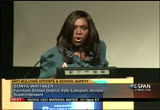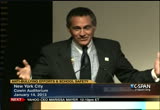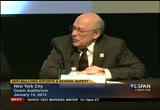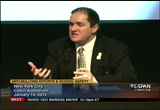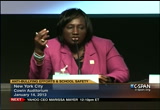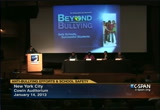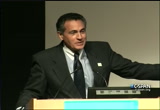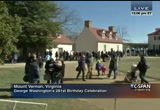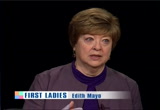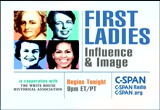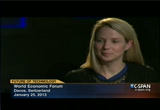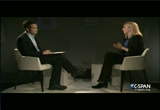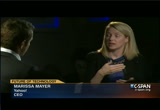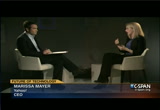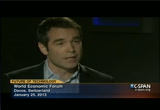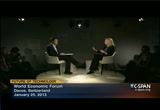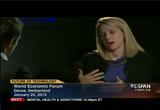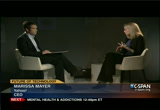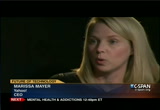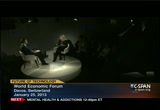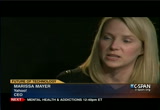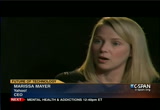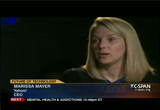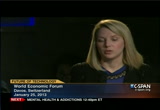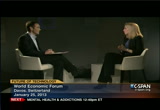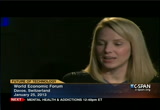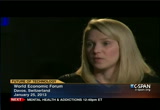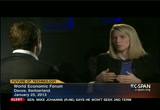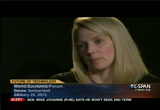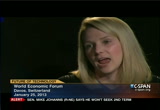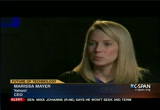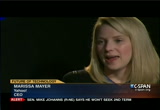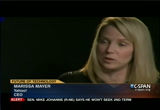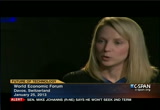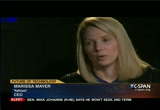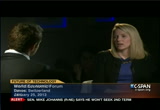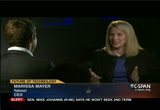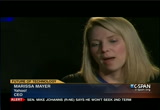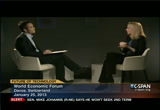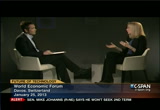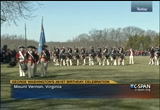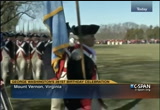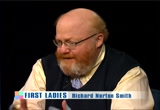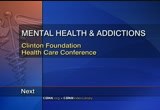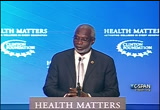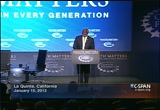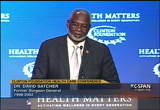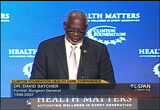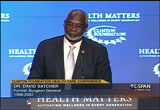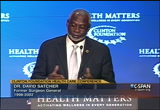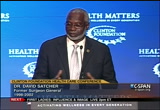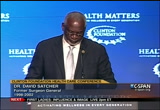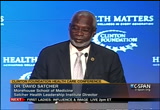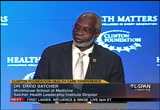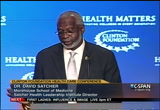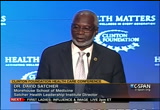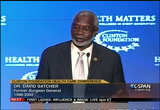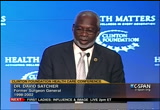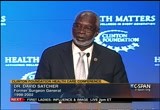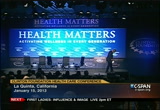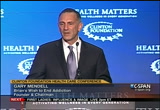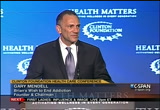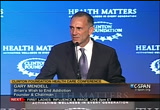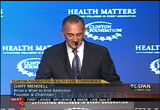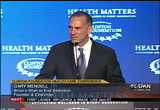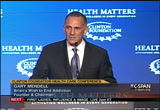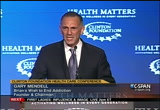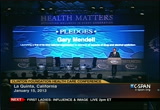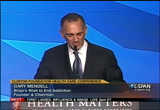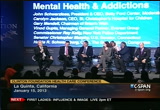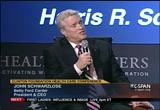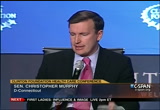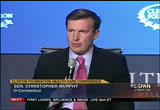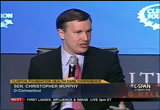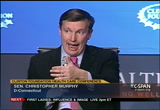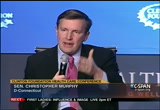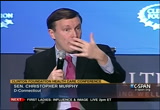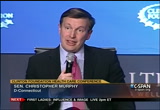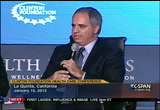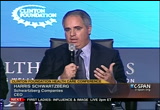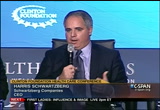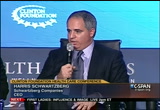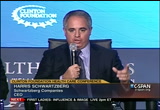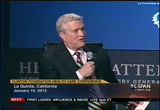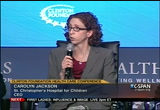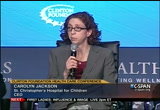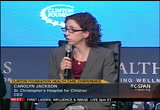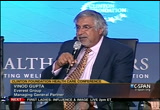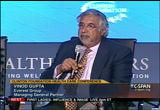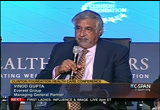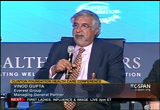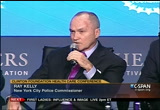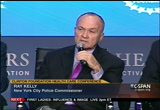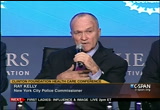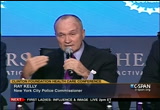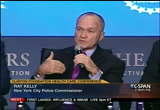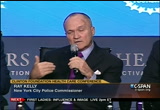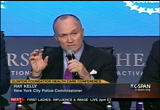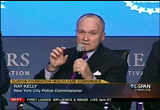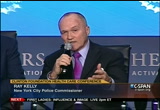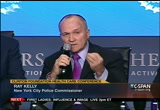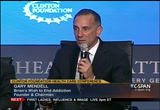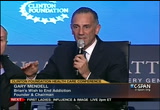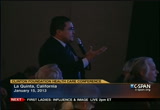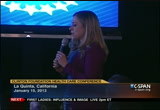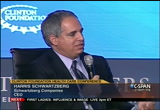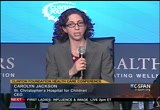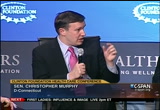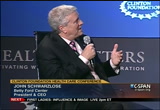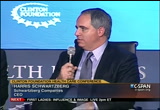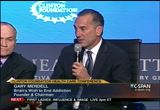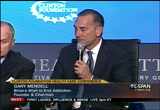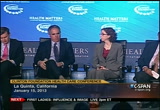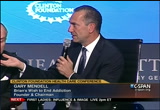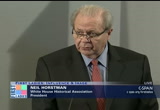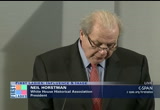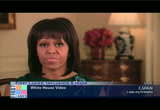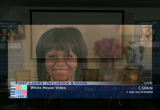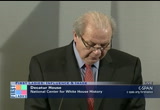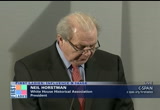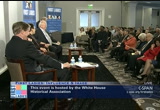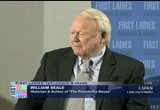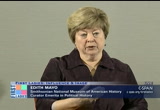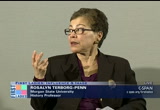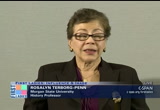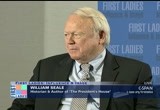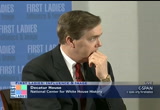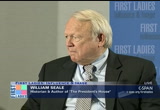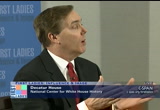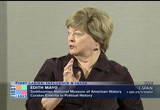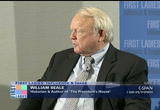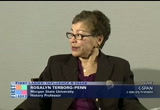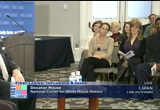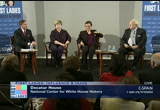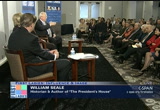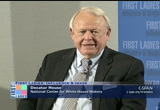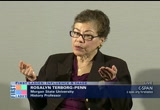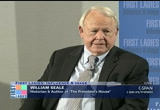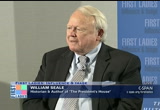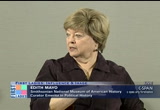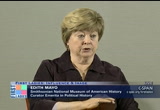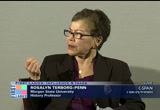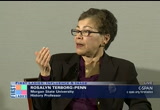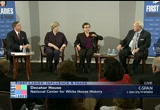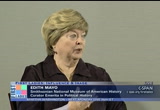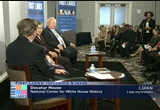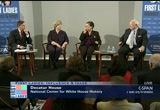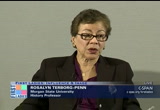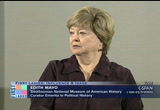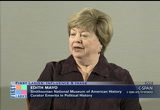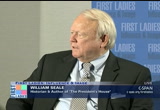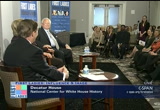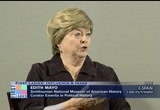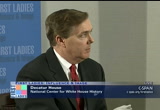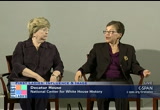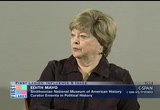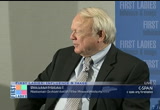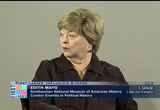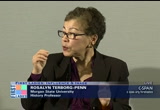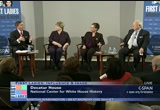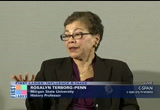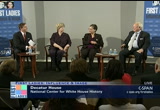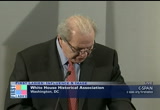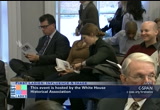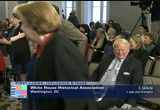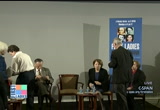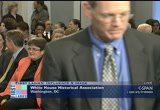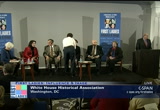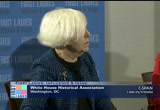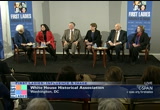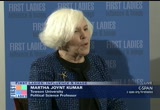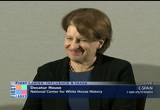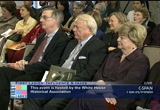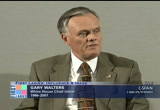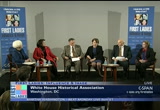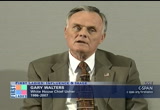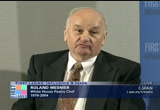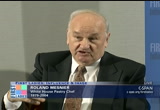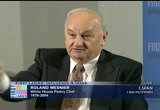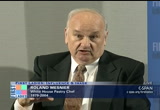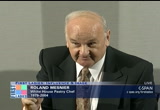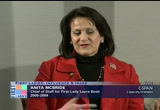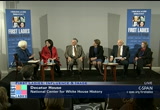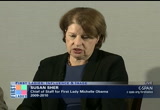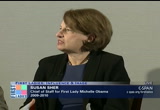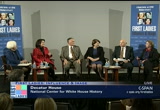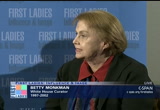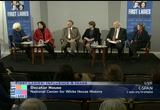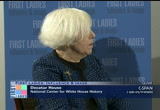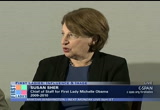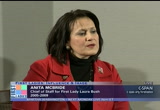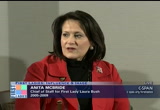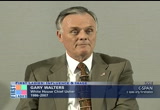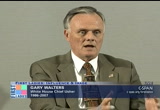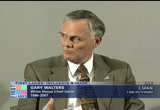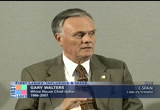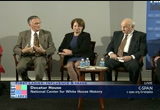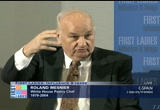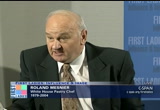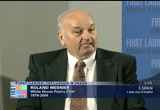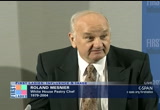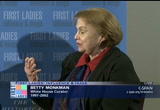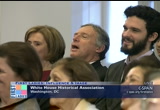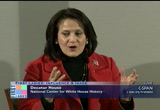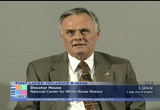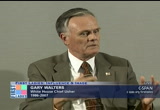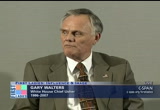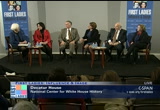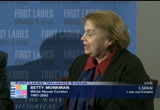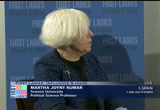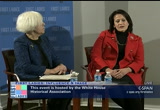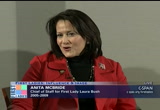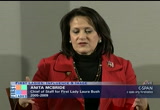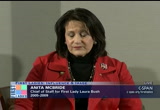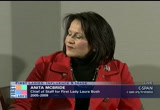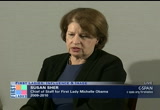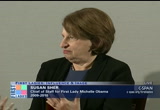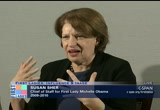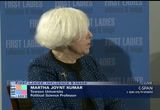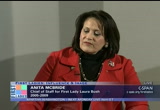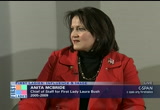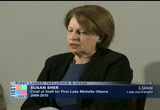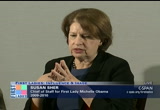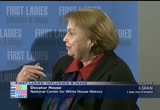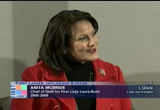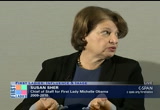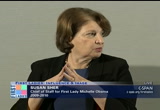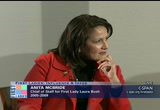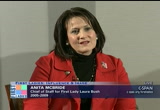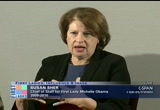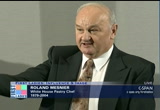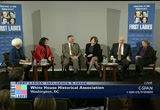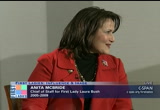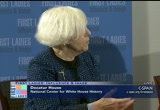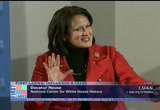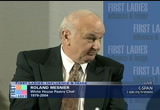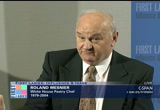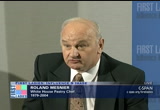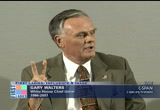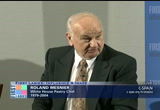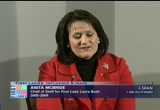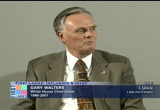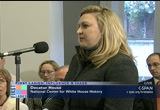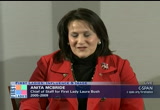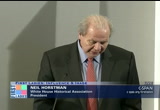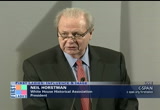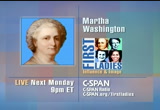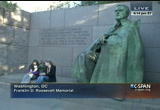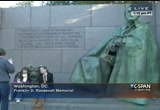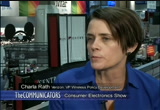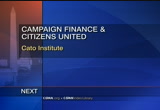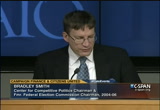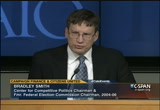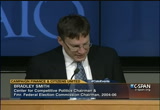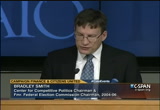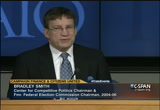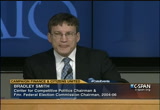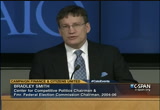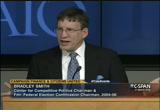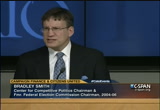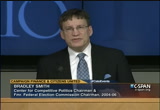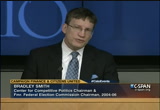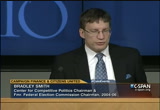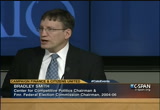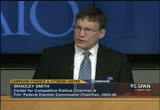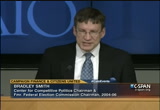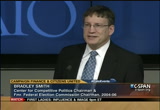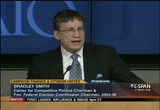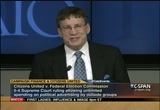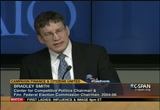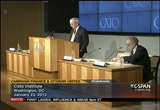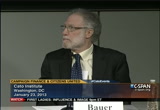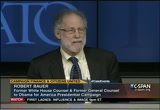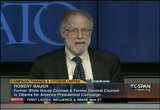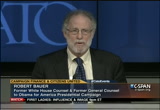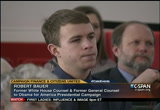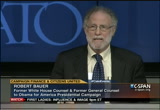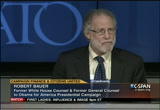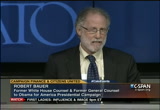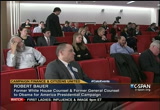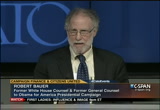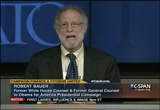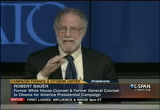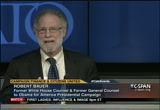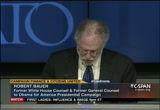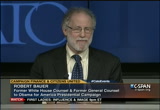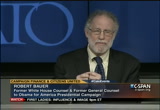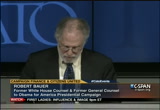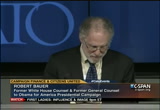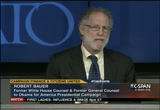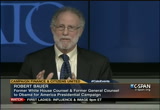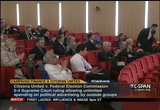tv Public Affairs CSPAN February 18, 2013 12:00pm-5:00pm EST
12:00 pm
gender. a strongto make connection between cultural competencies', teaching students how to resolve cultural conflicts and itsability to mapy decrease the level of building taking place in our schools. in an effort to be respectful of your time, i will leave it there. thank you very much >> thank you. i think we have time for maybe one question. since we only have one question, i will exert might executive privilege and ask it. this is a question that i want to ask the panel, given the success they have had. in this society, we know we have become a test-driven society. everybody is pointing to reading and writing skills, the results
12:01 pm
on those tests, and we are even in about a winning teachers on their ability to improve reading or writing, whether they teach it or not. it does not matter. when everyone is focused on that, how have you guys succeeded in pushing a social and emotional character development agenda so well? we do not have much time, so let's start with you, shelley. >> it is necessary that you help people make the link between social and emotional learning and the academic curriculum. people understand the culture and climate of schools is critical. i have indicated my board, teachers, and parents. the resonance of that has been very responsive. when you state it that way, i have not found difficulty in moving forward, in any of the
12:02 pm
district's i have been in. people understand character matters. when you create a positive climate, students will do better. >> for me, asa started this for us, and we can now let -- we cannot let children fall behind. fortunately, there is a lot of evidence that shows kids to have these skills to read better. we have been pointing back to the evidence of why this will improve reading, which is one of our primary goals. we have a great deal of opportunity with the common core. you will not succeed at a richer curriculum without these skills of persistence in problem- solving, ability to work with others. the common core, which you will hear about later today, oopened the other academic are
12:03 pm
opportunities in which to learn about social and emotional learning. >> we can talk a lot, we have the research and the numbers, but for communities, they need to see it. for us, what i have been doing is encouraging our teachers to inter-visit. i have been encouraging parents to visit different schools where you can see the interrelated this between the curricula, but also a place where people are nice to each other. people need to see it. in october, we had a district- wide conference focusing on bullying, not just looking at the reasons for bullying, but giving people the strategy's of how you go beyond. what needs to be in place in order for that to happen? the conference was focused for parents.
12:04 pm
we spent a lot of time -- it was saturday, so they give up their time. we reserve space so that we could take care of the kids while the parents were engaged, sharing some of their perspective. i think the entire notion of triangulating this in communities, looking at parents and schools, students, we have a committed to going initiative and one of our our schools where we are looking at what are the resources that our families need? it is not just what they need during the school day, but what do they need beyond the school day in order to do this work well? >> and the curriculum and standards must build the spirit and our children. we have to recognize, we
12:05 pm
practice the policy of the tension --attention-ality. anyone who approaches our doors with curriculum materials or other programs that might support us, they have to meet the checklist. if it does not address it, if it does not allow us to do it in collaboration with academic goals, if those resources are designed to push us towards addressing those topics in isolation, we address them. >> let me say what none of them mentioned, a significant factor is courageous leadership. we want to thank challis, eric, and gail, and sonya for being champions of social and emotional learning. thank you. [applause] [captioning performed by
12:06 pm
national captioning institute] [captions copyright national cable satellite corp. 2013] >> we are at the home of the united states first president, george washington. this is not vernon. visitors and staff are celebrating his birthday. his actual birthday is this friday, but in 1971, the date of the holiday was changed. since then, the federal holiday has not fallen on the actual day that he was born.
12:07 pm
visitors to mount vernon celebrating washington's 281st birthday this year. we will be taking it to other submitting a locations on this president's day holiday. in the meantime, remarks from marissa mayer. later, a look at mental health and addictions. before that, here is our look at our first ladies series. >> i think the women themselves in many cases were interested in politics but had no vehicle to express that in their own lives, so they were attracted to men who were going to become politically active, or were
12:08 pm
already politically active. >> each of them, i find, intriguing. probably half of them are out there because they are so obscure historical. half of these women probably would be totally unrecognizable to most men and women on the street. >> c-span premiers it new series "first ladyies." exploring the lives of the women who served as first lady. from martha washington to michelle obama. season one begins tonight at 9:00 eastern and pacific. watched the program earlier in the day live at 2:00 eastern on c-span. >> now the woman who runs
12:09 pm
yahoo!, cdo marissa mayer. she was at the world economic forum in davos, switzerland, and she shared her insights on the direction of new technology. she is the youngest ceo of a fortune 500 company. the world economic forum brings together thousands of liters in business. this is about half an hour. >> welcome to "insight and ideas with marissa mayer." the c.e.o. of yahoo! if i am not mistaken, this is the first such conversation since becoming ceo. >> that's right. >> well, it is an honor for both me and the economic forum. e're here to talk about the future of technology. let's begin with the one nut that no one seems to be able to crack. the platform shift from desktop to mobile.
12:10 pm
how do you crack that nut? >> it is really important. if you look at what is happening in terms of the shift to mobile, the number of mobile phones has tripled in five years. tablet sales will out-sell laptops this year if predictions hold true. it is really incredibly important. a lot of consumers are making the shift. one is understanding how this works, what this provides. and how we can benefit user expectations. the other piece is monetization. whenever you see a consumer shift of this type, there will be an interesting value added for -- to create modernization around it. >> where does that confidence come from? >> the bane of my existence
12:11 pm
from 1999 to 2004, i was at google, and every time i would interact with anyone externally, the one question they would ask me, search is wonderful, it is great to be able to find everything, how is anyone going to make any money from this? now that seems almost absurd, because search is the giant moneymaker online. that said, whenever you see consumers adopting a technology platform, a particular application like search with this much volume, you know that advertisers will want to participate. there's usually a way where you can introduce advertising such that it is not intrusive, that it adds value, that enhances the experience. that's what we need to work on. >> we can look back and see how that was done with search. everybody gets to play monday
12:12 pm
morning quarterback and feel smart about it. can you tell yet what some of the shifts will be in mobile that will allow mobile to duplicate the success of search as a money maker? it has to make money or else at some point innovation will grind to a halt. >> well, i think people already are. for example, the application stores, a lot of people sell applications. i think the main thing is, search is a daily habit. what people do on their phones often becomes a daily habit. when i thought about the strategy for yahoo!, i pulled the list of what people do on their phones in rank order frequency. if you ignore a few exceptions, and maps because it was really expensive and hard to do right, the list looks like, e-mail, weather, news, financial quotes, sports scores, photos.
12:13 pm
you get the idea. it was funny. because phil and i would recite that list on account of my being the new c.e.o. at yahoo! i would say what am i doing? my friends and family would say, you are describing yahoo! business. i would say, no, i am listing in frequency order what people do on their phones. the nice thing is at yahoo!, we have all the content that people have on their phones. >> search remains one of the defining experiences for most internet users. it seems to me that it will remain fundamental to what we do. how do you see it evolving? >> all of the innovations you will see in search will be in
12:14 pm
the user interface layer. if you look at the past few years, there has been universal search, search will not always be text based. when you are typing, it is responsive. voice search, a third of searches are done by voice on the phone. all of those types of things are what we will see in the future. i also think that there is a huge opportunity in the future around search personalization. what do i know already? what are my preferences? and how to present the information? we can go about how we shape the internet and order it for you. there are all of these news feeds all over the web. twitter, facebook. the question is, what order should people read these in the morning? what should they look at? how should they do that? to really do that, you need
12:15 pm
terrific personalization. >> personalization replaces search? once the computer figures out what it is we like to look for, it will look for it on our behalf? and we won't have to go and do it any longer? >> i think the right way to look at it is not that it replaces search, but that it becomes a critical part of the search. one provocative way of thinking about it is in terms of the logic, that is your query. in the future, you become the query. it is what you type, it is your background, it is where you are, it is your preferences, it is what you looked at yesterday. the search box can take all that input and create something that is customized for you. the nice thing is, if you are the query, you could possibly type in search terms. or you could be the query passively. this is the notion that we can
12:16 pm
pick up your contacts, who you are talking to, where you are. we can provide useful information or a series of links, pictures, videos more useful than your current context. >> right now for most of us, the web is still a very managed curated experience. how long does it take before we get there? >> i think it will happen in the next three to five years. a lot of what we have seen happen, image recognition, voice recognition, translation, these are backbone technologies. it is a matter of being able to take personalized notions, what articles to click on, taking all of those signals and mapping it to understand that when i like clean energy on facebook and i tweet out something about
12:17 pm
green energy, that is a same interest of mine. >> are different companies go to do it differently, is this something that everyone will have to move in the same direction on? you have to understand what the ontology of entities is. how are things name, how are they organized into hierarchies? for example, you need to know that wisconsin is a state and that there are cities inside of it. if i say i like wisconsin there are a whole bunch of interest that passed it off of that. he need to understand that hierarchy of objects. you also need to understand how they relate to each other. >> does this personalization
12:18 pm
become complementary to search, does that create a new paradigm? the most recent thing that any of the large internet companies have come out with is this social search that facebook has introduced. it is that a stepping stone? >> there is the social graph. what i am talking about, it will give way to the interest graph. you know this set of things i am interested in, you know the other set of things other people are interested in. they aren't just based on, did they go to the same school, do they work in the same place, they are based on, are they interested in the same things? we can create personalization technologies because you can see what people are doing and provide you with information. there's also a very powerful
12:19 pm
social component because we can show you interests you may have in common with people you did not realize. i recently found out that the founder of linkedin and i both had the same major at stanford. symbolic systems. so you can find these kinds of things in the interest graph. you can also find people who you may have never met who you should know because you have things in common with them. >> it would seem to me a pretty high bar to entry. you have to have a platform that is fairly broad and a huge level of user engagement. right? >> that's right. and we are lucky at yahoo! because we also have finance and sports and games and things like omg! celebrity news. there are a lot of different verticals. it has broad applications like search and mail. >> does the interest graph have
12:20 pm
the potential to disrupt the paradigm for tech power that was, in some way, set by your old boss, the four horsemen, could the interest or something else change that order of the universe? >> i think all four of those players do a terrific job, providing a lot of great experiences. all four of those people will become major players. the analogy misses that there are other players in the space. twitter is very exciting and interesting. technology is not stagnant. it is amazing to think about different waves of the internet and technology. the first wave was yahoo! itself. the directory. there are these pages out there, how do you organize them? then that got so large, the directory model broke down and gave way to search.
12:21 pm
the next wave came with social. now we're on the mobile wave. that has all happened in about 15 years. we have gone through four major technology shifts in terms of who the players are. there are always opportunities for a new disruption. i think a lot of this will be around interest, but that's just my prediction. >> so we shouldn't, as consumers or in any other role that we may occupy, worry about the control that certain companies may exercise over the internet itself and the information that it contains? >> well, i think that privacy will always be something that users should consider. i also think privacy is always a trade-off. when you give up some of your personal information, you get something in return. it is about making those trade- offs.
12:22 pm
how the information, allowing them to control the information you have, and choice. did you want to use the services in a personalized way or not? those are the big three components of privacy online. i also fundamentally believe that user data belong to the end user. >> >> the question of control is the one that gets people most exercise. how do you ensure -- how does any company that participates in the space, this industry, guarantee that remains the case and provides users with enough confidence that the information they share is not being abused? >> the second part is all about transparency. what searches do you have and how are they being used? that is something that is really important.
12:23 pm
there will be industry standards in terms of providing users an account statement. some of these primary platforms, what they show you it is what data you have stored there. one of the key pieces that also provides user choice is making sure the data is portable. it allows your barrier to switching carriers to be lower. one of the analogies i use, the papers you wrote in college, are they yours? absolutely. >> i feel that they are. nobody else is interested in them. >> but nothing else you have done over the past 10 years is not nearly as coherent and structured, but just as insightful in terms as they
12:24 pm
were your words expressed your way. and it tells a lot about what you learned. i do believe fundamentally they are yours. if you can take that history and pick it up and move to a different search provider and take that as an interest graph and use it in a different application, that should fundamentally belong to you. you are allowing the service to access it to get better information and better results. either they deliver on that promise or you take your data and go elsewhere. >> well, that raises an interesting question. should you be able to take all of that data? it sounds to me that it could be a great deal to move into one platform or another. is that possible? i can see a platform being resistant to that. >> it is technologically possible. a lot of the players are providing for something like that. it is not something that is generally something that people think about doing every day. but it is an option. i think it is an important one.
12:25 pm
it can give users a lot of confidence in terms of how things are handled. >> and described how one of your employees asked how yahoo! is going to compete if it doesn't have one of these four key distribution technologies. there is the mobile operating system, hardware, the brother, and social. i do not know that we got an answer. >> one of our employees as that. given that we do not have mobile hardware or a social network, how are we going to compete? >> it is a question for every company that seeks to compete >> of the four horsemen of the internet, almost all of them are playing in one, if not several, of those mediums.
12:26 pm
i think the big piece here is that it really allows us to partner. yahoo! has been a friendly company. it ultimately means there is an opportunity for strong partnerships. that is what we will be focused on. we work with apple and google in terms of the operating system. we have a strong partnership with facebook. we're able to work with some of these players in order to bolster our user experiences. >> is that diecast? you talk about this new graph, the interest graph. is that the kind of technology that will become key to distribution? >> with the web becoming so vast, there is so much context and so much social context, and now there is so much location context, how do you pull all that together? your personalization comes in to make sense of the content.
12:27 pm
it is the internet ordered for you. it brings yahoo! back to its roots. you cannot just categorize anymore. a feed of information that is ordered for you. it is also available on your mobile phone. >> some of those technologies remain -- there is competition in the browser world, in the mobile hardware world, and in the operating system world. what about social? >> facebook provides an amazing platform. now what happens with social is what you do with it. it will be the predominant platform. what happens in social is what you do with it. it is taking that and finding useful context.
12:28 pm
you are in davos right now, do you know who else is? and be able to offer me the opportunity to meet up with someone who i did not know would be here. >> there is a natural conflict in the world of technology between innovation and execution. we have seen many companies struggling with this. can both be done well at the same time? >> it was pointed out to me a few years ago. one hypothesis is what is the opposite of innovation? a lot of people would say the status quo. there is another school of thought that says the opposite of innovation is execution. if you have to be in execution mode, it is hard to find a space to innovate. for us, there is a great period of execution. can we take these products and revitalize them for the web and make the transition to mobile?
12:29 pm
will there be room to innovate? to say this is how yahoo! groups worked on the web, but now there are these new opportunities. can we spot some of those innovative ideas? >> is size a bear to innovation? >> i do not think so. you can innovate at scale and with large size. if you have 10 engineers and you are going to grow that to be 20 or 30, do you want to do the same set of things two or three times better, or do you want to be doing two to three times the things? interestingly because of execution, because there's so much the opposite, if you wanted to execute perfectly, get the
12:30 pm
design exactly right, work through the details, you would invest two to three times as many people per project. if you want to find those new ideas, it wants to take those same people and put them on something that is far flung that you have never thought about. it really is this tension. you can innovate at scale but you need to save room to have small teams working on those ideas. >> share with us your experience over the past few months. >> you arrived to an innovative company, but perhaps there was too much going on. what have you focused on? what are you most excited about? particularly the ones you have the most control over. >> i was genuinely pleased. i knew there had to be great people at yahoo!. the same way that when you look at art, you can tell if it was created by a nice person or not. or a depressed person or not. you can tell with yahoo!
12:31 pm
products that there are really nice, smart people there that have a great time. it is a great company overall that has a very fun culture. my first few months, my focus -- technology companies live and die by talent. we talk about the talent wars. it is not that people in talent wars are not competitive with each other, it is just that when you start to see the best people migrating from one company to the next, it means the next wave is starting. i believe that really strong companies all have very strong cultures. yahoo! is no exception.
12:32 pm
they have been a strong company for a long time. they have a strong culture. they are different from every other corporate culture. i want to find a way to amplify it. amplifying it is how you find the energy, and energy is what you can harness. if we have people and they are excited about what they're working on every day and they realize the next big hurdle is mobile, you can take that energy around the culture and find fun ways to apply it that can be really impactful. >> what are some of the things you found that we will see over the next few months? >> i do not like to talk about things before we do them. i do think a lot of the keys is what i have already talked about. there is a real opportunity to help guide people's daily habits in terms of the content they read. that is something we're really working on. all these daily habits, these -- news, sports, games,
12:33 pm
answers, groups -- these are the types of things where we have been underinvested in them. a little love will go a long way. yahoo! groups has not been refreshed in 11 years. it will go a long way if we start to modernize some of these products. >> when people get excited about technology, they forget about the role of design. going back to some of those routes and saying, now that social the allows everyone to be a publisher and for you to be
12:34 pm
able to find interesting question to answer, topics were you are a demint expert and write about them, and four friends who know you can come by your answer, i think there is powerful that we can unleash their in terms of the content for end-users and its utility. >> whether it is the big companies or start-ups, what other start-ups excite you? >> there are so many things. this is a question like to ask people. the one answer you never want to give is, i am very discerning, there is nothing that good. there are so many amazing thing that you get to see all the time. all kinds of amazing technologies on mobile. when you think about what it means to be location sensitive. something i've spent a fair amount of time thinking about. all kinds of terrific technology is there.
12:35 pm
some of these are very basic in terms of being able to check-in. if you know where people are and where they check in, there are all sorts of sophisticated thing that you could go on to do. there are amazing technologies like that. he in bridging out from the mobile technologies and desktop technologies, those are terrific things happening. in the world of biotech, being able to do dna analysis, analyzing and helping infertile couples doing a better job conceiving children there is a great company i know of. there is an amazing company working on wireless power. can you have an automated energy machine? they actually think you can send energy use in waves. the thing about that, in terms of us running around and putting
12:36 pm
things in, you just need to get close enough to the router to pick up on the power. what that could do to the world of advertising. the signs of bus stops little from behind, they have wireless power behind it. you could be at the bus stop and charging what you use your device. they're all kinds of exciting things that people work on every day. >> when people get excited about technology, they often forget about design. apple changed the way that many of us interact with technology. interact with the internet itself. that may be that form can be as important as function. how much you think about that? how important is it to what you are doing? >> i think about design a lot. apple is the gold standard. in that, apple's philosophy is that the design and technology itself should fall away. i think that is really true. i think in a lot of these interactions, technologies become very powerful when they do just fall away.
12:37 pm
the fact you can switch from is amazing. the fact kids are using tablets. parents will upload videos, showing before they even talk, they know how to turn the page on the ipad. they can have it within videos. they cannot even express what they like that part, but they know how to get their. what is powerful about that, it uses the national paradigms' that people already have embedded in their minds, in eight to us. it allows us to use technology. that is incredibly powerful. that's overall what you want to have happen, to be able to whittle away the technology so that all the complication lies underneath.
12:38 pm
there is that thin layer that you interact with. one of the reasons why voice recognition has taken off to the degree that is has and why siri is something that is so interesting for people. you can just say what you are thinking and transcribe an e- mail or a text or a search. now there is this whole set of technology and supercomputers that with your voice, you canyou can have it do what you want them to do. >> is that to say that a level of curation, something akin to a wall garden, may be necessary? >> i think there is a clear tension there. i do think that the application systems that exist in i.o.s. and in apple is very curated, but absolutely beautiful.
12:39 pm
i do not think it is such a bad thing because it has raised users' expectations for design. people used to not think about design or appreciate it that much. when you see something that is beautiful, it does create a lot of respect. i think that is one of the reasons why apple has garnered so much praise for its design is that it made sure that, for example, the entire ecosystem of politics on that platform work -- >> c-span is visiting historic sites on this president day. visitors are commemorating george washington's 280th birthday with the old guard fife and drum corps. this is the same group that guards the tomb of the unknown soldier at arlington national ceremoncemetery.
12:40 pm
>> after a successful bayonet charge. by 1779, the continental army had become a formidable opponent for the british. they were able to stand their ground during british bayonet charges and produced several victory during the latter part and ultimately help secure the independence of the united states. as a military tradition, military units displayed their disciplined, pride, and professionalism. the commander in chief when not pass 4 review for you the audience. once again, ladies and gentlemen, the commander in
12:41 pm
chief guard. [applause] >> a look at some of the activities at mount vernon today as we bring you to historic sites on this president's day. we begin our series on the country's first ladies in about one hour 20 minutes. here is a preview. >> i think the women themselves in many cases were interested in politics but had no vehicle to express that in their own lives, so they were attracted to men who were going to become politically active, or were already politically active. >> each of them, i find intriguing. probably half of them out there precisely because they are so obscure. half of these women probably would be almost totally
12:42 pm
unrecognizable to most men and women on the streets. >> tonight, c-span premiere's its new series "first ladies." historians, chiefs of staff, social secretaries, chefs, and curators explore the lives of the women who served as first lady, from martha washington to michelle obama. season one begins tonight at 9:00 eastern and pacific. watch the program earlier in the day, live at 2:00 eastern on c- span. >> before the inaugural episode of first ladies begins, here is a discussion on mental health and addiction. speakers include a former surgeon general, ray kelly, and connecticut senator christopher murphy. the discuss the challenges of dealing with mental illness including the lack of funding
12:43 pm
and the stigma that accompanies it. we will also hear from two activists that lost their son from issues from mental health and addiction. this is from california. >> thank you. i imagine you are getting a little weary now. it may seem as if we are changing the subject, but we are actually not. let me begin by thanking the clinton foundation and the help matters initiative team for including mental health in this year's discussion. that is critical. i know that president clinton thinks so. i want to take a few minutes to try to frame that issue in the context of our overall discussion. as surgeon general, in 1999, i have the opportunity to release the first ever surgeon general's
12:44 pm
report on mental health. and then i was asked by the director general of the who if i would come to geneva and present the report before that body in may 2000. so it has not been that long since we really started to discuss mental health at this level. i have to say, our major recommendation in our reports was for parity of access to mental health services. that was 1999. it was not until 2008 that legislation was passed, signed by president bush in october 2008, for parity of access and mental health services. president obama issued an executive order that resulted in
12:45 pm
the affordable care act, among other things. let me begin by defining mental health. i want to do that because we've almost immediately get to mental illness. but i think mental health is critical to think about. in our report, after a lot of debate, we designed -- defined mental health as the successful performance of mental functions. such that one is able to be productive in his or her work, to develop and maintain positive relationships with other people, beginning with families, to life to changes in one's and environment, and to deal with adversity. just think about that. being productive, developing positive relationships with others, adapting to change, like
12:46 pm
adolescents, for example, dealing with adversity. we saw 30% rate of depression in new orleans after hurricane katrina. so mental health is being able to deal with these life challenges and circumstances and to be productive. it should follow then that mental disorder, mental illness represents alterations in those mental functions such that one is able to carry them out because the mood disorders, thinking disorders, were behavioral disorders. so mental disorders follow immediately from the definition of mental health. i do not want you to take your mental health for granted, because that is what we do. we take our known health for
12:47 pm
granted, and so therefore, we are not sympathetic when people have mental illnesses, because we have not thought about the fact we could lose it. we do not want to take our mental health for granted. there were five key messages in the surgeon general's report that came out in 1999. the first message is that mental health is fundamental to overhaul health and well-being. mental health is fundamental. mental disorders are common. just as things go wrong with the heart, lungs, kidneys, liver, things go wrong with the brain. they always have and always will. the only question is, how will we respond, as individuals, families, as a society? we estimated 20% to 25% of
12:48 pm
americans will experience a mental disorder in any given year. almost 50 million people. somewhere around 13 to 14 million children experiencing some sort of known disorder each year. mental disorders are disabling. they are as disabling as cardiovascular disease or cancer. in fact, studies show right up there with cardiovascular disease and cancer, or between the two, in terms of disability. there was also some good news in our report. the best news, of course, was that mental disorders are treatable. 85% to 90% of the time, we should be able to treat people with mental disorders and return them to productive lives and positive relationships.
12:49 pm
mrs. carter, who held the first- ever white house conference on mental health, likes to say that recovery is possible. there is hope because recovery is possible, and indeed, we have that ability. the bad news from our report, more than half of the people who experienced a mental disorder will not get the treatment they need. only one-third of children. there are a lot of reasons for that in terms of our system, but there is also the issue of stigma. even today, we still have a lot of stigmas surrounding mental disorders. we keep trying to push back the stigma so that people will realize that mental disorders represent a brain disease. as i said before, just as things go wrong with other organs, they go wrong with the brain. i hope i do not need to tell you
12:50 pm
the brain is the most important organ in the body. it is not functioning right, nothing else functions right. we are involved now with the nfl, dealing with the issue of chronic traumatic encephalopathy with " but ballplayers and trying to prevent it with people coming up. it is not just with football, think about boxing, soccer, hockey. the brain is too important an organ to be subject to the banging of heads. so we have declared that the banging of hence can no longer be considered a sport. the brain is too important. that is the message we're trying to send at every level. kids start banging heads at elementary school seen what the guys on tv do. those are our major messages. i think we have made progress -- item and have time to talk about
12:51 pm
those -- but we have the integration of mental health and primary care. we have no integrated mental health and primary care in five mental health centers. we have developed a strategy for treating mental health in the emergency room so as to give dignity to the individual and family, but also to try to transmit them to continuity of care. we have demonstrated that we can reduce waiting times by as much as 80%, and reduce the cost by 60%. we can do a lot of things to improve mental health and mental health care. i want to say a word about the relationship between mental health and substance abuse and addiction. you have an outstanding panel following me who is going to talk about these issues and how they have experienced them in different capacities. let me say, and actions are, in
12:52 pm
fact, brain diseases, and dealing with addiction requires one to seriously encounter it addictions has a brain problem. christopher in his recent book "recovered to live" talks about what people in the addiction go through. and the importance of hope in recovering. you are familiar with the 12- step program. according to the director of the substance abuse and mental health services administration, about half of people, according to her, who are afflicted have diagnosable mental disorders. conversely, of course, what we see is a relationship between the severity of the mental illness and the risk of addiction. so there is clearly a
12:53 pm
relationship. it is something that we have to take seriously, as it relates to children, especially. alcohol is the leading addiction affecting certainly millions in this country, costing millions of dollars and lives, but also becoming addicted to illicit drugs of various kinds. of course, now more and more prescription drugs. there are other addictions, as you know. there is gambling. there is sex. these can all become addictions subject to the same obsessive compulsive behavior, which you will hear more about. addictions are serious, the cost millions of dollars and millions of lives every year. but prevention is possible and recovery is possible. let me close by trying to
12:54 pm
reconnect our discussion throughout the day with our discussion of mental disorders. when i left the government, after releasing this report on obesity in december 2001, we started a program called action for help the kids, working with schools. in this program, we were tried to get the schools to go back to physical education k-12, just taking more seriously the way that children eat at school, and the schools came back at us and said, we have all these problems. we are trying to keep programs, they are cutting out music. now you are going to dump this problem, dealing with those schools left behind, and you want to dump this problem on us?
12:55 pm
they went on like this until 2005, when viewing the literature, it became clear, those children who were physically active and consumes a healthy breakfast learned better. they were more disciplined in the classroom, they perform better on standardized exams on reading and math, so we called that the learning connection. three months ago in washington, we had been updated conference on that. but there is this connection between help the living and mental health. there is a connection that we should not forget about in terms of healthy lifestyles. if we want our children to perform optimally, a need to be physically active on a regular basis, a need to engage in regular nutrition -- good nutrition. that was a connection that we saw, an association, but as
12:56 pm
scientists, we want to go beyond that, we want mechanisms. now we have studies showing changes in the brain that takes place when children are physically active and get a good nutrition. weather is the frontal lobe or the hippocampus, there are changes that you can track changes of healthy lifestyle. knowing all of that, we have not been able to get to the point where we, as a society, are committed to investing in our children being able to engage in physical education k-12, and to have good nutrition. now, there is a relationship here that i think is really important, and it is that schools tend to be the great equalizer. i grew up in alabama during the worst period of discrimination and segregation. our parents used to tell us, if
12:57 pm
you just stay in school and get an education, you can go anywhere you want to go, do what you want to do, even though they have less than an elementary school education, they knew that there was this connection. so the schools were viewed as the great equalizer. when it comes to this problem, and so many children growing up in homes and communities, and may not know that they have access to help their lifestyles, healthier food -- hopefully that is changing -- hopefully at school they will have that. i think the schools need to be major players. especially now that we know that there is this connection between healthy lifestyles and mental health, mental acuity, performance. we even know, for example, in treating depression, physical activity should be a major part of that treatment.
12:58 pm
some studies show physical activity is equal to medication, but ideally we now know that it should be a combination of physical activity and medication in treating depression to be optimally effective. those are the things that we know. the brain is part of the body. in my opinion, it is the most important part. so when we talk about healthy lifestyles, one of the major benefits would be on the brain, and there will indeed be a connection, not only between learning, but between living healthy lives and mental acuity, and reducing a number of disorders and promoting mental health through healthy lifestyles. thank you. [applause] >> ladies and gentlemen, please welcome the chairman of the bryans' which, gary mendel.
12:59 pm
>> good afternoon, everyone. it is truly my privilege to be here today. i would like to extend my appreciation to president bill clinton, chelsea clinton, and their health matters initiative, for bringing to the forefront these two important issues, mental health and addiction, which are so clearly related. there is so much i want you to know today about addiction. i could speak about the facts all day. but today, i am here as a father and i speak to you as as. because if you leave here today knowing just one thing, i would like you to know about my son,
1:00 pm
brian. brian was from the beginning of very loving child, and always cared about others. but he also struggled. he struggled with anxiety, and he struggled with add. he was the last to be picked for soccer. but he was the first to crawl under a fence at yankee stadium to give a homeless person a quarter, which he did when he was a eight-years-old. that was brian. as a teenager, as many of our kids do, he tried marijuana as the use escalated, his mother and i tried absolutely everything. wilderness programs, up therapeutic schools, the best we have in the country. he tried his hardest, too.
1:01 pm
he even made it to college. but unfortunately addiction is a harsh and unrelenting disease. harder drugs followed. more relapses more rehabs. from one program he wrote me, dear dad, i want you to know i am trying my absolute hardest to be a good son. to know bryans character -- brian's character and the cruelty of addiction, i have to tell you what happened on a october 20, 2011 when he was 13 months clean. he spent the morning researching suicide notes. in the first he read was kurt cobain's. kurt's was angry and bitter, but brian was not.
1:02 pm
his note was about his -- is that this entire breadstick nation. even in his last minutes, his thoughts were about others. and i do not want to hurt anyone anymore, he wrote. do anything illegal or get high. i thought sobriety was worth a shot, hoping to get back to normal life, but has not worked. i love you all more than i can write. then my brian, the same brian that at nine months old i remember playing peekaboo around the coffee table in the living room and would crawl around the table and look up at me with that smile of his, then my brian, he hung himself. he was 25 years old.
1:03 pm
i wish i could tell you the english bowls with time, but it does not. it intensifies with me, knowing my son died of a disease that is preventable, and we do not prevent. that is treatable but we do not treat. that is undeniable, and we continually denied. a disease that in the time of this panel, 60 minutes, will 15 more brian's. 350 more will buy during this day. 350 more family members -- 350 more families will be torn apart. forever. as has my family. in the aftermath of his death, i
1:04 pm
set out to learn what could be done to spare other families from the suffering. it has been a journey in darkness. addiction works that way. it is shaded by stigma, family struggled and isolation. four other diseases there are research budgets, breakthroughs and medications. for addiction, there is some research but it is not put into practice where it could have lives ofan's life and so many like his. there are non-profits like the american cancer society that provide a place for families to turn to for information, support, and hope. for addiction, there is no such entity. that is brian's story.
1:05 pm
that's my story. if it were our story alone, it might end there, but it must not end there, because -- because it is the story of 20 million americans suffering every day with the disease of addiction and 80 million family members who love them dearly. so for their sake, and as a pledge to the clinton health matters initiative, and in brian's memory, i have made a promise. enough's. enough. no more research ignored. no more americans suffering alone, feeling ashamed because they have a disease. no more lives wasted. that is the promise of b
1:06 pm
rian's wish. our new organization will launch later this year with the new name that reflects the national mission. we will make a permanent and large-scale impact on this disease. the goal is simple, to cut in half the number of americans who suffer from this disease, the number of americans who die from this disease, and the cost to our society of this disease. the solutions are clear, prevention, treatment, recovery. we will provide resources to families, we will ensure parents know what puts their children at risk. we will move research of a scientist shelves into the communities where they belong. shelvesf scientists's
1:07 pm
to the communities where they belong. once and for all, we will eliminate this drama critics stigma of addiction. all this i promise as a parent -- once and for all, we will eliminate the stigma addiction. these are promises that depend on all of us. addiction requires a national commitment. addiction requires a national voice. it claimed my son, brian. it is not too late to save another parent's child. thank you. [applause]
1:08 pm
now, i would like to introduce john to come up on the stage. >> that was simply incredible, and what a way to start this discussion. thank you very much. congratulations to health matters and the clinton foundation for making sure addiction and mental health or part of this conference. 90-95% of conferences that are on health and health care did not include anything on mental
1:09 pm
health and addiction, and we cannot say enough about president clinton and staff for making this topic included. indeed it should be. look at the tragedies we have dealt with as a country in connecticut and colorado over the past year. everyone talks about guns. very few people talk about mental health. president clinton today talked about headlines in the past year that he paid particular attention to. one that i paid attention to was a headline that appeared in most newspaper saying we now have more deaths each year from prescription drug overdose then we do from automobile accidents. it was a shocking headlines. i hope it just does not sit there as a headline with little action. we have put a panel together to address this.
1:10 pm
we will make sure we leave time for your questions. there is a polling question to start with. approximately how many people in the united states die each year from drug and alcohol addiction? please text your answers in, and we will revisit that to see what your guesses are on that question. we have asked each member of the panel to take a few minutes and share with you, and then we will all take part in answering questions that people have. first, let me introduce the newly-elected, a kick from -- newly elected senator from connecticut, christopher murphy. >> thank you for having me in having this panel today. for the past 30 days i have been eating and sleeping and breathing newtown, conn. . brighter to my swearing in last week, i was the congressman, so
1:11 pm
that day i was on the scene a couple hours after the incident took place. to witness that hoping, incomprehensible grief is something that a lot of days i wish i had not seen, but when we were there, and the first reports of the shooting were coming in there were conflicting to do it was and how many there were. we knew. we were now the subjects of the tv stories. we have watched this on tv before. we had seen tucson and blacksburg's. we knew it was most likely a very deeply, mentally ill young man, probably in his early 20s. probably white. we do not know everything about adam laza we want to know, but
1:12 pm
we know he fits that description. -- adam lanza. beyond the anecdotal evidence of people with mental illness and cannot find treatment and go into something very troubling are equally troubling statistics. today there are over 8 million children and young adults living with a diagnosed serious mental illness. that is triple the number of young adults and adolescents who were diagnosed when president clinton took office. the number has exported -- exploded. the concurrent problem is this. over the past four years as the recession hit state budgets, which primarily pair the burden of taking care of these kids, funding for mental health has dropped by about $4.3 billion across the country, just the
1:13 pm
demand went up by 10 percent. so that bad news is the foundation for what could be to come. this gives us an opportunity to really confront tough questions for how we treat mental own this and how we fund it. i will flag areas of concern for me. i think the nra has gotten everything wrong in their approach to this tragedy, but maybe the most troublesome is the suggestion we should have a national database of everyone with a mental illness. as if there is some direct correlation between people that have a mental illness and a procession toward violence. we have made so much progress in the past 15 years and overcoming
1:14 pm
the stigma so that like my family who has a long, proud open history of mental illness we can treat it just like a physical illness. and what that all away if we get the response wrong in this way. if we go with those that say the answer is to keep a database of everyone with a mental illness or even serious mental illness, first, we feed the belief that everyone with a mental illness is prone to violence. it is not inherent in mental illness. second, we will make it harder, especially parents with kids to have a son or daughter on the verge of mental illness from getting help. it means that your kids will be put on a mass murderer watch list they cannot ever get off of. right now today you are not allowed to get a gun in this country if you have a serious mental illness that you have
1:15 pm
been adjudicated on, such that you can be prone to violence. i think we can make that tougher. i think we can talk around the edges of it, but i think it would be dangerous to further stigmatize. second is funding. we know there is a crisis in terms of the budget. the question is, we've balance the budget on the backs of state and mental health budget? one of the things i have been so stunned about is we often go looking for answers to big problems without figuring out what the question is first. what i mean is this -- we have these twin neurological funding crises in this country. we have an aging population with alzheimer's, parkinson's, and dementia. we have a tripling of the number children and young adults who need access to the system.
1:16 pm
these crises are in competition with each other. whether we want to admit it or not, one is winning and one is losing. i know we need to do more in terms of access to seniors who have serious neurological illnesses, but the fact is if you are an alzheimer's patient and are in medicare and medicaid you will have a pretty good shot to get what you need. corresponded to that is the deeply troubled mentally ill young man isolated living in his parents' basement contemplating evil is most likely not going to get what he needs. we are ready made that choice in the way restructure the funding was today. we need to be honest with ourselves that if we do not start thinking about that choice and whether we want to continue to make it, then we will not find the money someplace else. these of the conversations i hope come out of this. let's be honest about where money is and where it is not.
1:17 pm
not let's make sure we do do anything in the wake of connecticut that makes it even harder for the parent who knows they have a son or daughter who knows they need a little bit of help from going out and getting it. i think there are very important things that can come from this horrifying past 30 days if we get it right. >> thank you, senator. next we have mr. harris. [applause] next is mr. harris schwartz berg. >> i am here because i am very passionate about mental health, because i think it is one of the few things we can all immediately impact. i can speak about it on many levels. my family was touched directly by mental illness and my brother passed away about five years ago at the age of 47 after battling
1:18 pm
pie -- bipolar diseases whole life. i watch my family struggled with it, my family, and i know how we can tear apart a family, and we're just one of many millions. i see it as an employer with 15,000 employees in knowing statistically that of my 15,000 police roughly 4500 are dealing with some sort of depressive disorder -- knowing that of my 15,000 employees, roughly 4500 are dealing with some sort of the press of order. another 4000 are dealing with family members that have similar issues. we do not just see it in the way the government measures it with the fact that $50 billion of absenteeism, but also measure it with present he is some.
1:19 pm
i am here also as a parent of three girls that i know how to deal with many issues everyday, but the real reason i was asked to speak is the issue is very scary. the statistics, i do not have to repeat them. the number one market right now for inside the presence is preschoolers. that is a shocking number. -- for anti-depressants i preschools list. -- is preschoolers. the fear we have in my house and my family and everyone here, we of taken a little bit of action ourself as well. we have met at the university of michigan depression center, and we funded a stem cell research program there to see what can happen for our grandkids and my
1:20 pm
grandkids grandkids and oliver grandkids. then we went a little bit further and realize that our own community, there is nothing really going on to help the kids that are under so much stress, anxiety. we teamed up with the university of michigan depression's center and our local high school and created a program called the event program, which is to fight -- try to teach children and teachers how to study anxiety. what we are seeing is you can make a difference. what makes a difference is really just reaching out and speaking to people. the issue here is stigma. the stigma goes away when you are ok talking to people. when you reach over to your neighbor and say what is going on? we have gotten involved in what we hope will be the first of a
1:21 pm
nationwide program with the principle, a unique individual who has really taken this program and run with it, and receive the impact on the kids, but we're really here and i really here to discuss that we can help the stigma, talk about it. we all live in similar communities. we all know that someone has breast cancer, heart attack. you might call them up and ask if your kids need a list somewhere. how can i help you? you have never done that when you heard someone just institutionalize their 16-year- old. there is a problem with that. it is not physical. you cannot see it. it is the guy sitting next to you on the train, the high school quarterback. it would be better if it was a third arm so you can see what it is. but you cannot we have to
1:22 pm
realize that these people, regardless of the severity, it is a sickness and illness and cannot just turn away from it. we have to help. that is what we're hoping the program we're planning to get there will do in being out here talking very openly is a great first that. as i was telling someone behind the stage, is hard to find something else to do. the great thing i saw was when president clinton was proud of her daughter and gave her a kiss after her presentation. that is what we all have to do, because the kids have to say it. [applause] next, i would like to introduce carolyn jackson, ceo of st. christopher's hospital for children in philadelphia. thank you.
1:23 pm
located in north philadelphia, the third poorest nation -- district in the nation. our children grow up with significant challenges and health disparities. when i first came here in 2010 as the ceo i knew that we needed to consolidate our general pediatrics practices on campuses, and i knew that we need to expand them for better access. we have over 25,000 of kids to receive primary-care on campus. the thing i did not know when we started is we needed to change the care model. it took a bullet-rated -- bullet-riddled car for me to realize that. a group of teachers were fighting after school and a carload of boys and drove over to the home of three brothers to settle the score. when they arrived, they fired at point-blank range into the car, killing the teenagers and
1:24 pm
wounding the driver. the driver immediately came to say chris, the place he knew, trusted, the place where he and his friends had received care since infancy. that is when i realized it was not enough just to a better access. we needed to find a way to help the kids break out of the cycles that their circumstances have put them in. we created the center for the urban child. it will be going into a 30,000 square foot office building on the campus that tenet healthcare has graciously approved for us to build this year. the center for the urban child strives to provide high-quality, efficient cost-effective care for kids in the local community, while providing wraparound services that will address the determinants of their health. everything from food insecurity to domestic violence to behavioral health. from of behavioral health standpoint, prevention is the thing we want to focus on the most. most pediatricians do not treat
1:25 pm
mental illness. they are not comfortable with it and do not take the time to diagnose it. we will train our peers -- pediatricians as well as the general residents to look for the signs and symptoms of behavioral health problems in the children they care for as well as their parents. we will arm them with the tools to care for the less complex behavior and health issues. things such as mild depression and adhd. will have psychologists that will help the children immediately, if something is determined as a potential that may be more complex issues. we will have four or five exam rooms -- one: two every four or five exam rooms. -- one consult room to every four or five exam rooms. the big thing has been adverse
1:26 pm
childhood experiences. much like what we've seen in colorado and connecticut, there are events that happen every day that are small events that we do not think of them have a long- term impact on kids. these events have long-term impact on the behavioral and physical health of kids in communities. so we want to make sure we are also build think the resilience in to these children so they can overcome their circumstances. i am pleased to say joining us and a few weeks is our pediatrician in chief. dr. stonefeld has spent time recently in connecticut and in colorado, helping those communities and helping those adults teach the children how to overcome and how to have resilience and get past the terrible tragedies that happened. we believe his expertise as a developmental pediatrician as
1:27 pm
well as with the national center will help instill the same resilience for the kids in our community. our goal is to give the kids the tools they need to rise above their circumstances, and to become successful contributing members to our society. thank you. [applause] >> i would now like to introduce the managing general partner of the everest group. >> thank you. in my family i have to extreme situations. my dad is 95. he is a doctor. he is in good health. still working six days a week. sunday is the day he does not work and is very upset because he is not working. he works at a chervil clinic in new delhi in the get like 600 patients per day and they dispense free medicine and free
1:28 pm
consultation. on the other hand i lost my son when he was almost 28-years-old. exactly two months after he lost his son -. i could not believe what happened. apparently in the morning he just never woke up. we went to washington, d.c., and he was doing his mba program. yet one more semester to go. he just died of a sudden. i talked to the doctor who was in the coroner's office. he was an indian guide. he can say -- he said i can tell you what happened, a mixture of oxygen code on and alcohol. -- oxycodene and alcohol. said he would not believe, a
1:29 pm
young people are dying mixing with prescription drugs and alcohol. i said wouldn't they get sick. he said no. he said you mix them with alcohol and your heart just quits functioning. your brain does not give the signal. i called president clinton, and saw him. he knew all about it. his own neighbor who lost his son in the same way within 10 days i lost my son. he said we have to get the word out as to how these things happen. he called cnn. they did a one-hour program,
1:30 pm
which is just aired a few months ago. they're still broadcasting it. they talked about that. last year 15,000 people died from the misuse of prescription drugs. these are young lives. they did not have to die that way, you know. the program on tv. i got hundreds of e-mails from people. hundreds of families to of lost their children the same way. every day we read something in the paper, in the wall street journal, new york times where they're talking about a prescription painkillers and how they are being used -- abused. a lot of times people did not even know if you take a prescription drug and mix it with alcohol it is legal. so finally i told president clinton that's what we want to do is support the foundation in
1:31 pm
helping how to prevent future deaths. these floods can easily be saved you know. he was gracious enough to help us in this mission, and that is why i am here. thank you very much. [applause] >> next, commissioner ray kelly of the new york police department. >> thank you. i want to think the clinton foundation for inviting me. -- thank. i also want to thank president clinton for his efforts to stabilize at a millions of people around the world. i have been asked to speak about the challenges of prescription drug abuse, and i want to give examples of what we face in new york city. last year to men walked into a pharmacy in east harlem at 11:00
1:32 pm
in the morning. they were armed with guns. one threatened a cashier, and they have very specific directions. they wanted all the toxic oxy and perkaset. a clerk pushed the panic button. three police officers showed up quickly. the second started to shoot at the police officers. ran out the door. it was a retired -- there was a retired police officer across the street. he shot and killed this individual. this brought to an end a situation that could have been extremely tragic. this individual was wanted for four similar robberies and shootings. in long island, just before
1:33 pm
that, and off-duty agent went into a pharmacy to get croaks, cancer drugs for his father. he ordered all hold up. he was shot and killed trying to take action. the perpetrator was also shot and killed by responding officers. he had in his possession cash and ox andi. just before that an individual went into a pharmacy. he had no criminal record. he proceeded to shoot and kill to workers and customers in the store. he was looking for prescription drugs for himself. the police department has seen the destructive power of addiction firsthand. we a police officer injured in the line of duty. he was given painkillers,
1:34 pm
started to abuse them. he then started to rob pharmacies on his own. interestingly with him and some of the other -- some of the other robberies, they go into the store and only looks for oxicodene. we're purse current -- concerned about this being a gateway to crime, practically for young people. -- oxicodone. obviously with the proliferation of guns on the street, we certainly didn't not want that to be compounded. i must say as far as health is concerned, the overarching
1:35 pm
issue in policing in america is the fact that there were some in a concealed weapons, handguns on the street. in new york city about 60% historically of our murders for the past 20 years have been with handguns. for the past year we've been able to driver murders down to a 50-year low. we have done that, we believe, through a proactive policing and areas where there is an increase in crimes or violence. we a taken thousands of weapons off the streets, and we believe we of saved countless lives in doing that. certainly the abuse of prescription drugs makes our job that much harder, and in part, because the source of the drugs,
1:36 pm
the nature of the source. virtually all of them, unlike heroin or cocaine, begin with a bout with prescription. health-care professionals, doctors, and pharmacists in particular are involved, either willingly or unwillingly in the facilitation of the abuse of prescription drugs, and there is a lot of money to be made in this business. last year of the drug enforcement agency we raided an outdoor market in manhattan where they were selling these types of bills hand to hand. the confiscated 9000 pills. -- we confiscated 9000 pills. we have ongoing at least two dozen major drug diversions of prescription drug diversion
1:37 pm
cases. we have put together a strategy that we believe could make a difference. this strategy really forms the foundation of our pledge to the clinton health matters initiative. the first is we have formed a drug diversion task force with the drug administration association. this is a significant force. it also gives us access to their nationwide distribution database. this has been extremely helpful in aiding us to attack this problem. secondly we created an awareness program focused primarily on students in high school and college. we of teamed with the department of education. we have put together a curriculum that was finished in november of last year.
1:38 pm
we a begun teaching it in schools. at least 1000 students have already been taught. our goal is to teach many, many more. this fall we will begin this orientation at freshman orientation. when freshman, to colleges in new york city we have 71 colleges, and we think this can be affected. we want to reduce the number of robberies and burglaries that take place in this area. we are in the process of constructing the database of 6000 pharmacies in york and connecticut and new jersey as well. we call it safe cap. but the debate of this we believe we will give them very useful crime prevention, better
1:39 pm
lighting when the stores are closed, and a better system. that sort of approach. we are also doing of bait -- a bait program with the producer of oxicodone. will be gps buttons inside the pill bottles so we can track them. we think it can be of major help in conducting investigations, and also deterring this type of theft. fourth, we have engaged in a major training evolution for our own people. police officers and the over 5000 school safety agents that work in the new york city police
1:40 pm
department. we want to make them familiar with being able to identify these strokes, and also what they respond to. and if they cannot serve anyone who is obviously being affected by the drug. just last thursday the mayor bloomberg put out a directive in new york city that they are not to give any prescriptions for long-term or long use of the opiads. the prescription is only good for three days. they will not kill any that have been reported stolen or lost. we think these are common sense initiatives that will make a difference. nothing you do is without a cost. this will cost about $4 million.
1:41 pm
that is the basis of the pleasure -- program. we look forward to working in collaboration with the clinton health matters initiative. thank you. [applause] >> thank you, commissioner kelly. again, gary mandel. >> thank you. i already spoke, so there is not much more i have to add. i think after hearing the panelists is what i would add is every panel the spoke with wonderful ideas and programs. i think the opportunity is what i have seen as i of look this over the past year is what i've seen in other diseases. the american heart association has led an effort by being an entity that is brought together all of the different efforts and the country into a vision and
1:42 pm
leadership. the results have been in the past 20 years deaths by heart disease have dropped by 30% in the past 20 years. in cancer, the american cancer society has done the same thing. the initiatives happening in different states and different, smaller entities in the past 20 years. deaths related to cancer have dropped 20%. 30 percent down and heart. 20 percent down and cancer. -- in cancer. wise, there is no such entity for drug and alcohol addiction. the results in the past 10 years down 30, down 20. the deaths related to drug poisoning have doubled in the past 10 years.
1:43 pm
i would finish my remarks, which i started earlier, with hope. a new national organization that does not drink for drug and alcohol addiction. the results have been pretty phenomenal with heart and cancer. we can take these ideas and put them into action and -- in a national entity that has the power to leverage policy makers and people around the country to get the same results that have been achieved in cancer and heart. that is our vision, and that is our pledge to the clinton health matters initiative. [applause] >> we now have a few minutes left. we can take questions from the audience. >> when we speak about mental- health, one of the components i do not hear about or see about
1:44 pm
is the youth that are mentally or physically challenged, that are born with a condition that they have no control of. i hope to kickstart a little league program, and the challenger division is something that the little league established back in 1989. the program is huge, but -- i do not know where we would classify it as far as mentally and physically challenged youth and young adults, but we're missing the components. there are a few organizations that help out with youth and young adults that are physically challenged, but it is a trickle effect. the family members that are affected by it, residents involved in the communities. what would be your thoughts on the adults that are physically and mentally challenged.
1:45 pm
it is not a drug addiction or alcohol. they are born with it. how do we engage those folks and encourage them to be healthy members of society and not just pushed them to a place where they do not have a voice? our issue is there isfor a lot of the used to go to that are mentally and physically challenged. -- our issue is there is no place for youth to go to that are mentally and physically challenged. thank you. >> who would like to address that? >> one of the things we have is a special needs clinic. that addresses just what you mentioned. not all of the children have mental health issues, but they
1:46 pm
all have at least physical health issues. we have that clinic partner closely with our developmental pediatrician, and with what we're doing for the center of urban child. if we can get the lower level behavioral health issues out of the psychiatrist's office, then they can be freed up more to care for the kids to have the complex medical conditions that are more difficult. i think a medical home is really something good for that and something we are developing. i would be happy to talk to you about that if that would be helpful. >> thank you. i am so grateful he challenged us last year to talk more openly and comprehensively about mental health. one thing i kept thinking about while each of you were talking is another conversation that clearly is long overdue and our country, and we had just heard a to have around bullying.
1:47 pm
bullying often seems to fall on both sides of the mental-health equation in that those bullied and lawyers often struggle with depression, anxiety and have been clinically dead those with mental health challenges. i would be very grateful to hear whomever would want to comment on how you think your work either in the school districts or the hospital or anyone who was working on addiction, how you think about your work helping to eliminate the real challenge of bullying that seems to be so pervasive these days in our schools and online chat rooms and across the country. thank you. >> again, back to where we started talking before. where we're seeing is the first up is i do not want to say confrontation, but talking.
1:48 pm
in the program we're working at in this school, which is right near the house actually is listening to these kids come out and say what is on their minds and it is helping some of the problems. the kids are talking about what is bothering them and what is bothering them about the other people, and the dialogue being built is attacking the issue of bullying. the police generally have something going on themselves, and this is their outlet. if we can do a good job of cutting their legs out from under them, and letting them speak openly, and let the other kids were speaking saying it is not all right. it is as simple as letting the kids openly talk. we are seeing in various places, and the folks at the university of michigan are seeing the same thing that open dialogue is
1:49 pm
working. in the past a lot of times it was the bully who was told to stay home, do not do anything. now, it is a very open dialogue. that is helping them. >> we have not focused on this too much, but what -- but when i was in texas prior to moving to philadelphia, our local school district was very involved. it was all about cutting out bullying. they would form organizations within the schools where it was their job to be friend everyone, and their job to have random acts of kindness, and they created a chain of caring and rode down the events that they did in the schools and in the district that or caring for others. it was amazing how many times the chain it wrapped up the football field and had this amazing ceremony that invade the community and kids. there are things out there.
1:50 pm
i think that is a partnership with the school and a pediatrician office in the communities. >> there is a wave of change that people are figuring out that school climate is one of the most important things you can do to impose discipline, and also provide incentives against bullying. there is a wonderful program that started in chicago. president obama was a big component -- component of it. it was screaming schools around incentivizing good behavior. we invested a lot of time and money and that in connecticut. it paid dividends in terms of referrals into the school discipline process, and also, pay dividends in the number of incidences of bullying. and we for schools to report incidents of bullying so we can track who is doing well into is .ot doing well and repea
1:51 pm
pbis is one of the success stories that has reduced bullying, and we're pushing legislation to provide money to bring it to states that have not seen it yet. >> it is very hard to find money for prevention. when i think about what happened in connecticut, that is one of the things i focus on, do we as society -- can we decide we're going to pay for this? whether it was private dollars, public dollars. i told a couple members of the panel that we have a unique children's program for children from 7-12 that live every day of their life with addiction because of their parents or step-parents. it is very hard to find programs like that, because no one is willing to pay for them. how do we change the commitment of the society?
1:52 pm
salt with the program was started at the high school, when we came in to speak to the school to talk about what they're doing for depression, society, they had no program. the answer was we had nothing in the budget. our answer was we will pay for it and bring the resources in. educators told us it was the first time in 35 years they had a private member of the community say they will do that. it comes back to being a good member of the community, and not necessarily writing a check, but it is shocking when you look at the cost it adds to our economy of mental health. $50 billion just from absenteeism. and it is not that hard to put the programs to the other, and the economics are very simple. the costs of not investing in the mental health system cannot
1:53 pm
take 10 years to pop up somewhere else on the budget. they show up in that 12-month time period in the past two years we of closed 4000 psychiatric inpatient beds in this country. during that same time, prisons have seen a 25% increase in the number of prisoners with serious mental illness. we all know a prison bed will cost you $30,000. the psychiatric beds will cost you less here than you find those dollars somewhere else in the system, whether it is a homeless shelter or prison. it is in real time, not 5-10 years down the line. >> except for gary, i did not hear, what specifically is being done to try to demystify mental
1:54 pm
illness so it is seen as a disease, and who are you reaching out to, if anyone? what else do you need? members of the media are here and members of the entertainment industry are here to help you put a face to it and speak to the community at large without fear. >> the answer is if your question is what is being done and what can be done -- three parts. what is being done? what can be done, and how can people help? what is being done is very little is the answer. as i said, you have american cancer, american heart, american lung, autism speaks, which has done a wonderful job and is only 7 years old. there is no american addiction
1:55 pm
and mental health society. it does not exist. what is being done? very little. half the americans in the united states just -- i just read the gallup poll, half americans do not believe drug addiction is a disease. it is scientifically proven. the reality is there are about 80% of kids in high school tried drugs or alcohol. those are not all bad kid, 80% of kids. they are all our kids. one in 12 become addictive. half of those become addictive because it is genetic, and the other half become addictive for certain risk factors, probably 50. is genetic, 30. is other risk factors.
1:56 pm
probably 50 is genetic. 30 is other risk factors. very little is being done. what can be done is we need a national entity to represent these diseases. and raise the dollars that are raised by those entities. for example, american cancer raises $950 million per year. most of it is raised by millions of people putting in 20-$30 each. american heart raises about 600 million per year. again, 85% of it is people putting in $20 each. the beauty of it is not only are they putting in $20 or $30 each, but they are becoming members, activists, they're writing letters to the congressman, getting laws changed.
1:57 pm
i am leading to the third question of what needs to be done and how can everyone help? the first thing you can do, again, in my opinion, go to brianswish.org and sign up and we will keep you informed as we move forward. what i see our entity doing, which i think is the answer in solution, is taking a wonderful idea is we have heard of here today, and finding out which ones have evidence behind them working, and which ones should be brought to scale across this country. why are we doing it in new york city? why can't we replicate it and do it across the country? if there is something working in philadelphia, we should find a way to bring it to scale and bring it across this country.
1:58 pm
we should text it. we should randomly control it to see if it is working. if it is working, we should take it across the country. that is what is done with american cancer and american heart. american cancer spends 125 million on research. american heart spends 95 million. for this field privately we're talking less than a couple of million dollars of research per year. 125 million, 95 million, less than a couple million. that is what needs to be done in my opinion. i am not saying it is easy, but it is doable. it has been proven by mothers of drunk driving. proven by autism speaks. it can be done. there is no question it can be
1:59 pm
done. i'm not saying it will be easy, but please go to brianswish.org to give us your e-mail address. i work -- i want to work together with this team up here to find out how we take these ideas and bring them together and skill them across the country. to me, that is the answer. >> c-span is at the decatur house today in downtown washington with the white house historical situation established enough to -- national center for white house history. it is where we begin our first series, first ladies. our first group of historians will discuss the history of america's first ladies and a panel will talk about the first ladies from the perspective of white house.
2:00 pm
[captioning performed by national captioning institute] [captions copyright national cable satellite corp. 2013] >> i am the president of the white house historical association. welcome to the new public home, the david m. rubenstein center for white house history. in a recent arrangement with the national trust preservation, which owns this decatur house complex, the association is now co stewards of this historic site for 30 more -- for 30 or more years to come. first ladies, influence and image is a partnership project with our good friends at c-span. i would like to thank our colleagues there. if they would wave, i would like to acknowledge them.
2:01 pm
the co-chief operating officer, vice president of programming, and the executive producer for the first lady series. we appreciate their enthusiasm for a subject that rarely receives the attention it deserves. as you will see in your program, listed on c-span's website, the series will be a comprehensive visual biography. over the course of 35 shows in prime time on monday nights each first lady will get her 15 minutes of fame and many will actually get 90 minutes. tonight is a special kick off for the series and we are so pleased that our guest here in washington and those at homes from coast to coast are joining us for this moment. we have expert panelists here to enlighten us. i will introduce them in just a
2:02 pm
moment. but first, we have a special message from first lady michelle obama that we would like to share. >> hello everyone. i am pleased to kick off this series d telling the lives of america's first ladies. in the coming weeks you will have the chance to learn about the stories, achievements, and legacy of these truly a remarkable women. as you watch i am sure you will begin to see why i am so honored and humbled to follow in their footsteps. working on causes ranging from the trustee to women's rights to environmental stewardship, each of these would then left their own indelible stamp on the white house and on our nation's history. like them i found that this role offers an extraordinary opportunity to give back and make a real and lasting difference in people's lives. for me that has meant help our
2:03 pm
kids lead healthier lives, working to get our military families the benefits and support they earn, opening the white house to as many people as possible, and encouraging all of our young people to achieve every one of their dreams. no matter what causes we take on as first ladies we have all shared the singular experience of meeting people from every corner of this country and seeing firsthand the character, courage, and spirit of our fellow citizens. that is the true blessing of being first lady. that is why i do my best to live up to the example of the women who came before me and the people that i need every day. folks who work so hard and contribute so much to this great country we call home. >> our panelists may come and join us.
2:04 pm
we are so grateful for mrs. obama taking the time to wish us well and offer her reflections on the role of the first lady. they will be eliminated by those we have gathered here today. -- illuminated by those we have gathered here today. later we will bring you a first- person point of view from within the walls of the white house itself. our first panel will be moderated by steve scully. mr. scully is c-span's senior executive producer and political editor. since 1981 he has been responsible for coronary -- for coordinating all aspects of c- span's programming, c-span.org, and c-span radio.
2:05 pm
elected by his peers from the white house press corps, he is the former president of the white house correspondents association in 2006 and 2007. he currently serves as a waca board member. joining steve on stage, we have edith mayo. she's the curator at the national museum of american history. her books include "the smith sonian's book of first ladies.:" rosalyn terborg-penn is an
2:06 pm
author focusing on the american women's history. her books include african american women and the struggle for the boat, 1850-1920. she is a university professor and has founded the association of black women historians. finally, we have william seale. he is a great friend of the association. he is editor of white house history, the award winning journal of white house historical association. [laughter] he is also a ham. [laughter] you will indeed received a copy of the journal at the end of the
2:07 pm
program. he is also author of "the president's house." it is my great pleasure to turn it over to steve scully. >> we want to thank decatur house, our partners for the project. our panel here, these of the people that have been the guiding force behind this project. thank you for being here. i want to begin with you, why study these first ladies? why these women important to understand and know? >> they are extremely interesting because they are the ones closest to the president. we all say "if i could have only been there." well, they are. they are wonderful observers and also make a difference. >> edith you have studied the
2:08 pm
first ladies. from martha washington to the turn of the century into the 20th century, how did it change over that hundred 25 years? >> to begin with, nobody thought the first lady was going to do anything. i think that one of the things that is very interesting is that the white house, or the executive mansion in new york and philadelphia, provided a situation where you had the president's home and his work place both in the same place. martha becomes a social partner and hostess for the nation to her husband. abigail is a political partner to her husband. having those two rules established, the women who follow can merge or change or
2:09 pm
advance one or both of these aspects. dolley madison combined them. then you have a position that is very visible both at home and to visiting diplomats. it has become more visible, more activist, and the technology has changed the coverage of the first lady's role. >> during this time period, which first lady made her mark? who had the most influence? >> in the 19th century, i cannot pick one. let me take two? dolley madison, because she can set you -- she conceptualizes first lady. she is the fourth president's wife and only the first first lady.
2:10 pm
she is in the white house in the beginning and seems to enjoy all of the activity. i think she personified that. after she is long gone, they considered her first lady. i think she is significant. i also like mary todd lincoln. she has had a bad rap. the movie is fiction. even though some of it depicted her. she was of very influential woman in terms of her husband's feelings about slavery. she comes with an abolitionist mind. she also worked in the community among the free blacks in particular, of raising money for the downtrodden in the city. and during the war she was a volunteer nurse. so what can i tell you? i think she really personified a lot of the things we think of today as the role of the first lady. >> who enjoys the of first lady
2:11 pm
the most? if you want to use the word "detested," who would you put on that laslist? >> julia grant. suddenly she had a pedestal to be on and she absolutely adored it. she loved it and try to persuade him to run for a third term. he didn't, she didn't like it. she tells how they got on the train to leave washington and she fell and wept and wept. she claimed her place in later life and would come back in great glory to the white house.
2:12 pm
i do not know if anyone hated it. mrs. franklin pierce came in under horrible circumstances, having lost two sons. one of the way to the white house. she was a pretty good politician and she was as smart lady and was involved in political things that she just did not have the heart for it. at one point she fell in love with jefferson davis's two year old child. and then he died. that happened again to her. i would say she is a candidate for not liking it, jane per se. -- jane per se. -- jane pierce. >> supposedly she fainted when she heard her husband was a
2:13 pm
nominee for the presidency. that would give you some idea about her feelings of being in politics. then she had this horrible tragedy that she never recovered from. >> i already mentioned dolly madison. in the early part of it she enjoyed her role as first lady. >> i agree with that. >> she was voluptuous and laughing and painted up. and he was a mousy little man. he was quiet and a genius. she absolutely adored him. they were inseparable. a lot of it was taking up things he couldn't do. >> she was his pr person.
2:14 pm
if that position had existed at that time. she loved doing that. she loved presenting herself as "queen dolley." the republican queen with a small "r." i think she is thoroughly enjoyed her roles. >> we learned that jackie kennedy was the first one to have a press secretary? >> no, i think it was edith roosevelt that had the first one. >> that was for her specifically? >> the series is titled "influence and image." let me ask you about the influence these ladies had on their spouses. who were among the most influential? >> mrs. tax -- mrs. taft was very influential.
2:15 pm
i suppose mrs. madison would be one. another one was mrs. hayes from ohio. she was not only be loved by the american people but she had a big influence on him. >> you talked about the image earlier. which first lady was most concerned or consumed with her image? >> i do not think she was consumed with her image but she certainly image hurt us and's presidency -- imaged her husband's presidencey, and that was dolley madison. she conceptualize the white house as a stage on which her husband can conduct politics and diplomacy and which she can present herself as first lady.
2:16 pm
she decorated the white house. she was the first person to do so. previous presidents had brought their own furniture and so forth and she was the one who decided that this needed to have a professional touch. she hired an architect to come in and help her designed the furniture and reception rooms. she was very instrumental in imaging his presidency. >> didn't she also cling to this in later years of poverty when her son ran for everything she had? and the issue of the dress, which may have been taken before the white house was burned, because it was packed for summer and mrs. madison took these things with her. a journal seemed to be published in white house history. [laughter]
2:17 pm
she wore her red dress over and over again. there is thought that that dress was made out of those curtains. >> what was the name of the book? [laughter] >> look at the early 19th century into the civil war, the turn-of-the-century, the industrial revolution, women getting the right to vote in 1920, the great depression, how did these women reflect the times in which they lived? >> i think eleanor roosevelt is a good example of that. she was into everything. she remained so even into the kennedy era. i was amazed to learn that she regretted that she had never gone to college. i have -- i was shocked she had never gone. she was home school and went academies. i suppose she had an equivalent of what we would consider a
2:18 pm
college education. on the cutting edge of every reform -- and one of the reasons was she did not have to stay at home. there was someone there to be the secretary and housekeeper for her husband. she was all over the place. i think she is a good example of the growing influence of the 1920's and women's growing liberation. the idea that women can get out into more -- that coincides with the women's suffrage era as well. >> i was going to say -- looking at the first lady, you can pretty much tell what is or is not happening with american women at any given point in the historical past. i think the present a particular
2:19 pm
window on the past. everybody knows the position of first lady. whether you know in particular first lady or not they become a wonderful hook on which to hang a lot of other historical events. i think they serve as a window on the past. >> if we have two microphones on each side so if you would like to come up to the microphone -- a brief introduction of who you are, where you are from, and a brief question. we will get to them momentarily. we would not be here today if it weren't for jackie kennedy. this would be one of those government nondescript office buildings. explain the story behind that and how she tried to redefine the role of first lady. >> the area was doomed to be high rise office buildings.
2:20 pm
you had commerce. this was to have a six story or seven story white model building designed by the people who did williamsburg. it was modeled for the time. the well-known separatist the architecture was a friend of the kennedys and both of the kennedys were upset about the white house losing its residential scale and its neighborhood. between mrs. kennedy and the president himself, they stirred the fine arts commission to resend -- to rescind permission to build this building. it happened right at the end of
2:21 pm
the kennedy administration. mrs. kennedy personally appear at the fine arts building and stirred everybody up for it. that is what happened. that is why we have lafayette square. >> jacqueline kennedy certainly was -- that was one of her causes, historic preservation. we see that through saving pennsylvania avenue as well as the white house. when she moved to new york she credited activities that save grand central station and a number of historic sites. that is one of her causes. >> and to think she was 32 when she came to washington and immediately set the white house to be a more appropriate setting. it looked like a sheraton hotel. [laughter]
2:22 pm
mrs. kennedy wanted antiques and things and it. she was persuaded against that. kennedy was very worried about that, creating a lot of trouble over furnishing. it proceeded with it and she got a crew -- she got a guru. it was a lollipop era. >> jacki was determined to be behind the scenes. a lot of people to not realize that the influence she had upon jack -- one of them was the idea of improving within's role in society as a whole. she was the one that taught him into establishing a woman's condition -- a women's commission. >> you talk about dolley madison, was there a 19th
2:23 pm
century counterpart that preserved the white house or make changes that has a lasting legacy? >> go-ahead. >> the garfields -- no, it was the hayes' first. withdidn't know what to do the white house, it was beat up and happy. they went to the library of congress and asked what would be more appropriate to have in a historic white house. he came up with this idea of a first lady's hall with portraits of all the first ladies. hayes was very excited and he commissioned mr. andrews, who became head of the corporate. he did another one -- the
2:24 pm
library commission paid $5,000 for that. and then he did another one of of dairy voluptuous dolley madison and the library commission said "no." the garfields did the same thing. the roosevelts insisted on using various artifacts. they took the lincoln bed and draped it up. they fixed the place -- mrs. herbert hoover was the first one who did a scarlet approach to it all. she had all of the objects in the attics and storage documented as to what they were when they came to the white house. that has all been a treasure to work with as far as a curator. >> the hoovers paid for their
2:25 pm
own entertainment. >> and they received many charitable things. they were immensely rich people. they have -- >> one of the women in the 19th century was very concerned about the size and the grandeur of the white house, mrs. harrison. she and her husband came into the white house on the anniversary of the presidency. it had been 100 years since washington had been inaugurated. they had a very large family and they found that as the present the -- the presidency expanded, the rooms in the white house were being taken over gradually by people who were assistance to the president or who were executive assistants and some white. she thought there should be a west wing.
2:26 pm
she had an architect drop plans for an expanded white house with a west wing and an east wing and gardens and one of the wings was supposed to be an art gallery because she thought we should showcase of american art more than was possible to do in the white house here. this renovation would bring the white house into the modern era. but one of her husband's opponents in the congress would not pass the appropriation. there had been all of this planning and all of this work and she had very strenuously lobbied through teas and luncheons. what a legacy of that was it did not happen then but there was so
2:27 pm
much discussion of it that when the roosevelt came in they picked up on those plans and redefined them. and then you get the west wing and the renovation of the white house. >> harrison's life never lived in the white house. james buchanan never married. when they never married, who fulfilled that role? >> they have hostesses the invited to come. interestingly enough, dolley madison was the hostess for thomas jefferson. if you didn't, a daughter would become law or a relative would be, or one of the wives of your closest friends in government. you had this. let me get back to this idea of
2:28 pm
renovations and changes. it is a recurring theme that you see all the way through. since dolly madison was the first one who lived in the white house, she was the one who was there when the british burned it down. the idea was getting it back together. you see this recurring theme and dc it strongly with some women rather than with others. mary todd lincoln wanted to clean up the mess that buchanan left there. she was stressed from congress because she was, "spending too much money" on redesigning. the jackie kennedy had the same idea of finding the original furniture and putting it in. i think that that is the theme we need to think of.
2:29 pm
>> and nancy reagan as well? >> yes. >> the whole idea of the first lady who images, in many image -- in many instances, her husband's administration. >> how did we get from the washington to the current first lady? >> dolly madison. [laughter] but that is the first one. >> sack retailer, who was president at the time when dali died -- zachary taylor, who was president at a time when dolley died, said she was the first lady of the revolution. >> after mrs. hayes, it is constant. >> let us get to some questions. please introduce yourselves. >> i work here at the white house historical association.
2:30 pm
my question for the panelist is was there a first lady who husband did not have a particularly successful who isencies whbut remembered for being a good first lady in spite of that. >> that is a good question. [laughter] >> this may be a first. >> maybe mrs. coolidge. it depends on how you feel about calvin. grace coolidge was a very beloved figure, particularly in washington. she had a very outgoing and affable personality where he was known to not say too much very often. she was his pr person because
2:31 pm
she got along with everybody and had a wonderful disposition. her nickname was "funny." >> mrs. hoover, too. she was president of the national girls scouts. she was very active with children. she was very sensitive to racial issues. she was out there, big time. the hoovers are remembered as the ones to give us the depression, probably not fairly. >> how she approached the job as first lady, how he approached the presidency back in 1923 when the party died -- for >> that i do not know. i think bill would probably know that better.
2:32 pm
>> to be frank, mrs. harding was considered class a in washington. she was rougher than most first ladies. >> how so? >> she was very outspoken. the hardings entertained in the white house with all of the booze on her. platas roosevelt said whiskey on the table and spittoon on the side. they were rough people but women idolized him. one of the first record its beaches was his dedication to the tomb of the unknown soldier. it is perfectly beautiful, that baritone voice. there were problems with florence. >> some many of the white house family members -- so many of the white house family members have been vilified for reasons that our political sometimes.
2:33 pm
people resented the fact that florence was a good manager and ran her husband's newspaper, ran his campaign -- and i argue that people might have not liked it but they respected her. they might have talked behind her back but then they did that with a lot of people. they did that to mary todd lincoln. it was not just a twentieth century thing, it is something you find through out. they talked about jackie kennedy. it is interesting to the kinds of things that happen. politics, as you know, it's ugly. i am going to tell the truth -- they talk about michelle obama. "she does not look like a first lady." in my experience, none of them look alike. the only difference is she is brown.
2:34 pm
that is significant. you hear about the publication more so than you hear about their success. >> let me turn it over to hear. >> i in 8, washington dc. -- i am nate, washington dc > talk about frances cleveland and the relationship between grover cleveland and his ward. he married her out of guardianship. she was emulated and admired. tell us more about that relationship and her role as a very young first lady. >> she was the jacqueline kennedy of her era. she was young, she was beautiful. when they first began courting people thought she was dating -- people thought he was dating her mother.
2:35 pm
he had asked her mother's permission to begin writing to her when she was in college. he sent her flowers and candy. it turned into a courtship. when it finally announced their engagement, i think it is such a wonderful commentary that when they would appear in public after they had announced their engagement come if there were a band at the occasion, they would strike up a song from the mikado. "he is going to marry young, young." [laughter] when she went to the white house she tried to protect the family from reporters and spying eyes. all these rumors into maybe the children were deformed or had some terrible disease, this is
2:36 pm
why nobody could get in to see them. grover had to issue a press release saying that wasn't the truth. france is herself met with the press and said she was so fortunate to be married to this wonderful man. would it be that every woman in america could have such a happy marriage. >> woodrow wilson also married in the white house. anybody else married while president? >> tyler did. his wife died and then a year later he married a woman his daughter's age. they had about a year in the white house together. in anrl's father died
2:37 pm
accident aboard the steamboat. she went into mourning but she wasn't going to miss the parties. >> next question. >> i and emily porter, i am a graduate student at george washington. i would like to know now that is runningnt's wife for president, she is actually going out there and campaigning for him -- is that in modern conception or is there someone from the past, 19th century or earlier, that we would have been surprised to know played a huge influence in getting her husband nominated. >> in the late 19th century, you had some new campaign techniques. one was the front porch campaign which had not been used in the
2:38 pm
earlier part of the 19th century. and you had a whistle stop campaign. the early front porch campaigns were garfield and harrison. what you find is that type of campaigning brings up the party's base full to the home -- brings the parties faithful up to the home. the wife becomes invisible partner on the ongoing campaign, even though at that point she, herself, did not become politicized. she is very much in her home. she was very much a part of her husband's campaign. you find a lot of women in the 20th century who were campaigning behind the scenes. certainly eleanor roosevelt was extremely active in the
2:39 pm
campaign. by the time you get to mamie eisenhower, she was the one who accompanied her husband to the west will stop -- to the whistle stop. that is a real watershed. after mamie, you cannot have a presidential wife who is not involved visibly in the campaign. >> harding had a front porch campaign, too. >> winded first ladies began to take platforms? the literacy campaign with barbara bush -- >> i would say ladybird johnson, "lets beautify america." >> and certainly jacqueline kennedy in raid -- in renovating
2:40 pm
the white house, which i thought was a brilliant stroke because she was still involved with the national home, so people are not in fear that she should be interfering with. it was so much based on scholarship and the decorative arts that after that it is very difficult to see a first lady without some kind of cause. >> about lady bird, i think "beautify america" was code for "look at the environment." just the white house. i think she was really on the cutting edge of modern day environmentalism. >> she gave more than two hundred speeches on preserving the environment and taking
2:41 pm
environmental responsibility for the nation and the world. >> thank you. >> i am with morgan state university. you mentioned you believe a lot of the first lady's reflected what was happening in the country at the time. i am wondering if any of the first lady's, aside from their humanitarian or civic and efforts, to time to champion when menopause liberation struggles or were they active in any form from within's struggles? >> certainly in the 20th- century. betty ford brought the feminist movement to the national forefront and was unapologetically a feminist. before that, i would say lucy hayes championed temperance,
2:42 pm
which was very much a feminist issue in the 1870's and 80 '80s. if you were married to someone who was an alcoholic, it devastated your family. at a time when most women did not work, if you had an alcoholic husband or sun, it devastated your family. she was a temperance advocate. if you go back to mary lincoln, who was very much in favor of abolition, probably more so than her husband. >> my favorite is abigail adams. >> remember lincoln said temperance was going to be his next cause after the imagination proclamation.
2:43 pm
-- the emancipation proclamation. >> their influence as first lady? >> pat nixon was one of those who greeted the white house. she really built the collection that was there now. she shuffled them in the, the antiques and paintings and things like that. she acquired them in very large numbers. she could be remembered for that. >> it is very interesting, jackie kennedy is the one who is known for beginning that -- refurbishing the white house. but it was pat nixon who brought in more arts and antiques than any other first lady. she is hardly known at all. it was very interesting when we put up the first lady of the -- i had put a
2:44 pm
section in it of what mrs. nixon had done. i received a wonderful letter from julie eisenhower saying she was glad her mother was being recognized for what she did to the white house. >> another behind-the-scenes kind of person, you do not know how much to give on international level. she travels on behalf of her husband to various countries throughout the world. she believes in public education. together the carters -- everybody was horrified by. it was the idea of bringing the common people's ideas to the board. it was ok to be a regular person whose child goes to public school. mrs. carter was quite active and
2:45 pm
is very rarely recognized for that. >> we conducted a poll, this is going to be very quick, i want to ask you a yes or no. should the first lady be paid? >> you are looking at me. i think not. i think she would come under all kinds of scrutiny. i do not know who would be her supervisor. i am sure somebody would. that would be very limiting to her role of being able to choose a cause or champion some particular avenues of approach to the first lady's role. >> i agree. >> the other question, should the first lady have a job outside of the white house? should they be able to hold a position. >> they can now. there are no rules. if you worked along with a
2:46 pm
husband and he or she became president, why would you do that? why would mrs. obama called back to the law firm or hospital in chicago? i do not think it is likely. >> i disagree. it depends on the situation. mrs. obama had already given up the law firm when she started having her children. that was a choice she already made. if she is already a professional woman, and i do not mean going to work in the local canteen, if she is already a professional woman and she wants to continue her professional activities she should have the option if she so chooses to continue to work in her profession. >> should be job of the first
2:47 pm
lady, the platform or roll, be a platform for politics? >> definitely. i think it already is. i do not think it to be married to a man for 20, 30, 40 years and have shared his career and his bed that she is not going to be involved. i cannot see how you can separate those. >> final question for each of you. if you could sit down with a former first lady and ask her one question, who would it be and what would you ask? >> you would do that. [laughter] i do not know. i cannot think of anyone. >> my favorite one of all time was lady bird johnson. i would have loved to have had a conversation with her. i would have asked why she
2:48 pm
didn't run for president. [laughter] >> i guess it would be jacqueline kennedy, for me. how did you stay married to that man with all that was going on in your marriage? [laughter] thank you very much. and the book is titled? >> what book? [laughter] it is called, "white house history." >> thank you all very much for being with us. [applause] >> thank you all for very much. we will take a moment to get our next group of panelists, situated on the stage. -- our next group of panelists situated on the stage.
2:54 pm
>>, so much. i would now like to introduce the moderator for our next panel. she will provide brief introductions of our panelists. for a more detailed biographical information, you will find those in the programs at your feet. martha joynt kumar is a professor at the towns of state university. -- at the towson state university. she is also director of the white house transition project, which is a non-partisan effort by presidency scholars to provide information on presidential transitions and white house operations to those that came into the white house
2:55 pm
in 2001 and 2009. she worked with the transition operations of presidential candidates barack obama and john mccain, and with a team representing george w. bush. i will reform the -- i will refer you to your programs for more information on her publications. proudly, i can say she is a proud member of the board of directors at the white house historical association. >> thank you. we have a wonderful panel here that represents people who have worked in the white house over several administrations in the residence staff and people who have come with particular presidents and first ladies. if through our discussions we will get a sense of the environment that a first lady operates in. it is a difficult place to be. in some ways it is as beautiful.
2:56 pm
as the white house is it has many different roles. it is a museum, it obviously is a residence, it is a park, and it is a workplace. all of those combined -- for the first lady it gives opportunity for her and her husband, and also some hazards as they live their lives in the white house. it is also a place for children, a place to raise a family. with a first lady who has received no compensation for what she does, it is a difficult thing to say exactly what her role is. we will talk about the environment and talk about particular first lady's.
2:57 pm
among our panelists, they have been in the white house since the. when betty ford was first lady. -- since the period when betty ford was first lady. she does a great deal about the operations and the comings and goings. gary walters worked as chief usher from 1986. he came from a time when betty ford was first lady. he worked into the bush administration. susan sher was chief of staff with michelle obama.
2:58 pm
and that he is curator at the white house, a position that came about as a result of the work jackie kennedy did. we are going to talk about state dinner and use that as an introduction for all of us and how they are put on, where the first lady comes into it, all of the various parts of the white house that get involved. it certainly is a big event and one that involves everybody. gary, can you start as off? as chief usher you handled the residence staff. >> i would be glad to. the first notice of a state dinner or state visit comes from the state department. it usually goes through the
2:59 pm
social secretary of the white house. soon after the socialists a cap -- after the social security -- social secretary had a conversation with the first lady, he would lay out who, when, where, and how it was going to be about. there was a lot of planning. usually these events are planned three, four, sometimes as much as a year into the future. sometimes a lot less time. the planning is intensive. i think one of the things people forget about state dinners is that they set a style for the white house from a social aspect and they also set a first lady's style. we deal with things like the flowers, the table settings, what color dress is the first lady going to wear at a state dinner?
3:00 pm
i can remember the chief florist at the white house getting together with the first ladies and actually having a sample of the fabric, the color and and how the table was going to be set, with what kind of decorations. but basically, the first lady has a tremendous responsibility to set the tone for a state visit. i wrote down a number of different things that the first lady gets involved in, first through the social secretary, and then things that should deal directly with. they include about eight different things, the flowers, the shoes, the decorations, not only the decorations at the
3:01 pm
table but what flowers are trees are plans will be put around the state floor for the official visit, what the decor room is going to be for the dinner, the kind of dress that is going to go forward. is it black tie, is a white tie, is a business? the color choices, i already went over that, with the dresses and colors of fabrics and tablecloths. but there are a couple of other things that usually fall under the first lady's aspect of what she is dealing with, and that deals with a great deal of how the service personnel are going to present themselves. quite frequently at these dinners we have in the visual aspects of a foreign country, the kind of foods they like, whether or not they all are -- there are allergies to certain food groups, and there are a myriad of details that the first
3:02 pm
ladies have to go through, burst -- both personally and with the novel with the chefs. the cheap floral designer has to be involved with choosing the entertainment with the social secretary. what music is going to be played at the state dinner, what music will be played for the dancing afterwards. there is a myriad amount of questions that have to be asked of higher and that she will have to make decisions upon to allow these dinners to proceed in a good manner. >> can you tell us about the menu? and make sure and talk about your dessert. [laughter] >> to be able to perform at the white house, to be involved with steak dinner or in the level better, it is really an honor, let me tell you. there is no better place to cook or bake in the world.
3:03 pm
you are having fun doing it, let me tell you. the involvement with the menu, it was quite an ordeal to come to a final menu, because we had many people who had their hand in this do, as they say. -- with their hand in these do, as they say. you would start with a basic menu, and then you would come back, people with allergies, and not only allergies, but people from different denominations, like if you have kosher people at the dinner. there are so many things you have to watch out for. some do not have shellfish and this kind of thing. it is amazing what you have to go through before the file menu. usually what i did, i waited
3:04 pm
until the chef and the condition -- in the shaft is in the kitchen and then i put the desert out. then it was a sure bet for me that all the kings had been worked out, so it was an easier way. -- all the kinks had been worked out. when you come to the white house, at first you don't know which way to go. when people come from hotels or places outside, and you want to continue what you have learned outside in the hotel business. in the white house, and to mrs. reagan's time, they pretty much had their menu and desert like you would have at a hotel. you can go back and look. you'd find pie, chocolate cake, good stuff there. i don't think mrs reagan cared for pipe or chocolate cake. she said to me once, we in
3:05 pm
california don't eat cheese cake. actually she did, but that is another story. [laughter] so i knew right away that she was looking for something else. can i deliver? i don't know, but i am surely going to try like hell. there was a head decorator at the white house and he was very close to the family. he had a good eye for food and everything, and colors. he did help me a lot, i must say. so you get your sources from wherever you can. i think this is windy deserts came, under mrs. reagan in the white house in those years. she definitely want to take a different approach.
3:06 pm
i am sorry to say after i left, it stopped. [laughter] if you want the truth, i am giving you the truth. but it was such a pleasure. mrs. reagan rarely told me a lot. she is a mentor for me. she told me that in the days of work, you don't have eight hours, you have 24. she did teach me that. on several occasions when she requested a special dessert, it was so tedious. in those years i was the only pasty person in the white house. she requested a special desert, and we had two days before the state dinner. i said mrs. reagan, the desert
3:07 pm
is wonderful, but i have only two days left. that is when she said, you have two days and two nights. [laughter] it sounds really harsh at first, but it is the best lesson i have been taught, because the sky is the limit if you push yourself, and you can make it happen. and if you do make it happen, you feel like the king of the hill. and she is the one who made that offer to me. >> can you tell us about a particular state dinner, or how the process work? >> sure. as gary was talking, i was thinking about what he said about the colors and matching the colors with the fabric and the flowers on the table.
3:08 pm
the first white tie state dinner that the bush and administration did, working closely with the team and the social secretary. one of the most fun calls i got to make was to the queen's dresser. i said what color is the queen wearing, because we certainly did not want the first lady of the house and queen elizabeth to be in the same color. so that was one of the little items. there are so many people in so many things that go into making this a beautiful event that is respectful of your guests and also reflective of the president and first lady, and we all want to put our best foot forward when we are working in the white house. this is the time to showcase everything that is perfect. >> did the first ladies talk about a state dinner as being an event that was showcasing america, what their goals were?
3:09 pm
can you tell us about that? >> certainly. the state dinners are really about diplomacy, and the role of the first lady and her office, with great help from the state department, there is a huge amount of protocol involved. there is no detail that is too small. whatever one does, one does not want to make a mistake that would be insulting in any way, so there are great number of details, but it is important to remember that it really is about diplomacy and enhancing the diplomacy between two countries. our second state dinner was with mexico. because of some of the personal touches, part of it was tablecloths that were mayan blue, and there were roses and
3:10 pm
prickly pears that were just stunningly beautiful. but my favorite little piece of it was that we had -- eastern was the dinner, and na 10th -- and then a tent for a wonderful, lovely entertainment which was by beyonce. there were moderate butterflies looking like they were floating down. the significance is that montmartre butterflies fly from rch butterflies fly down from canada and they land in the birthplace of president calderon. so that is meaningful, and these touches make a difference. one other thing i would add is that we had an outside chef,
3:11 pm
rick bayless, who is a very well known -- he is american but his food is mexican, and people at the time questioned why we would do such a thing, since obviously the best mexican food is in mexico. it is because we have had conversations -- the first lady had visited mexico and was with the president and his wife and they had heard about rick bayless and expressed an interest. >> betty, can you tell us about some of the research that goes into first setting up state dinners, and that first ladies might do? >> we do keep records and the curator's office, clipping files and information, historical information on entertainment over the years and the particular state dinners.
3:12 pm
we were were a resource for many ideas fort deserts for the particular countries that were being entertained at a state dinner. we worked with the first lady's office in terms of needing to order additional pieces of presidential china that would be used for state dinners as well. we had supplements made of the fdr service and the wilson service to fill out those services, because they had been depleted by breakage and so forth over the years. in the year 2000 when the white house historical association offered to fund a new state service, we work closely with mrs. clinton in deciding about the colors, the designs that would go on the service, how those particular colors would looked in the various settings
3:13 pm
in the state dining room are the east room. i do remember mrs. clinton's mother was living in the house at the time. she would come to some of these little meetings about showing samples from the porcelain factory. none of them seem to be satisfactory. she said of in the bathroom of my suite is a beautiful yellow color. she said i think we should try that yellow color. so we got a sample of the wallpaper and sent it off to lennox, and they did some samples, and it worked out beautifully. i think that was mrs. rodham's legacy in terms of state dinners. [laughter] looking at the transitions into the white house that a family makes and
3:14 pm
the transitions out as well. often, for a president, he has been running for office for a couple of years and he is a political person who has most likely been at the white house numerous times, but in coming into the white house, the first ladies really have not spent much time. we have an example with michelle obama, she was not familiar with the white house, where as laura bush was familiar coming in during the george h.w. bush presidency. tell us a little bit about michelle obama's transition in and how she prepared for it. >> michelle obama is a serious student, but i don't think there is any way one can be prepared
3:15 pm
in a sense to really know what is going to be like. her husband had been a u.s. senator for a few years, but she and the girls had stayed in chicago where her whole family and support work. the bush people were incredibly helpful and generous about what the office was like and the structure and all that. the bushes were as well, personally, when the obama is visited. but i have to say there's just no substitute for being there. mrs. obama and the family were first at the adams hotel and then the blair house and into the white house for coffee, as is the tradition on inauguration morning. and everyone went off to the inauguration, and then what the white house residence staff does is just unbelievable, where
3:16 pm
in that time when the inauguration is going on, in this case they move the bushes out and the obamas in. they walk in, and now they live in this new home. it is really quite startling, and i don't think there's any amount of preparation that can help one understand what this all means. >> can you tell us about the bush is coming in, and then gary can tell us from the viewpoint of running the whole operation how that transition works. >> i was not here working with her directly at that time, in 2001, but i had been part of the transition team, the one that was set up in virginia before the election was finally decided.
3:17 pm
once we were in the government's space, we were planning from the personnel side of it. one of the first visits that a president and incoming first lady get this from the chief usher with a list of things that they need to think about and be knowledgeable about when they come into the white house. i will let gary talk a little bit about that. but 2001 was a very different experience than some past transitions. we did not know for six weeks with the president was going to be, so not broke -- no real official conversation to be taking place to prepare for a transition. certainly very different than 2008-2009, when, in fact, mrs. bush had everything packed up and almost out of the white house well before january 2009. they are rich just a few little
3:18 pm
boxes in the china room that needed to be moved out. -- there were just a few little boxes. she was very prepared. but it is incredibly seem less -- seamless. the news burkett -- the new first family is really not aware of it, and is just so extraordinary. gary can talk a lot more about how the staff handles it. >> transitions are unique. there is a four-year transition, when a president is running for reelection, just as obama just did, and the staff has to start gathering information on those people who are in the opposition party, who are also expecting to be inaugurated on january 20. when i was there, i started six- eight months earlier, gathering
3:19 pm
information on the candidates who were running, and then once the political parties had their conventions and the selections were made, i became more intent on gathering information on the nominee. sometimes that is difficult. after four years, you have to be loyal to the family that is there. it is their home that we are talking about. luckily, i was involved in the home, not the political aspects of the white house. some people forget that at times. this is a family that is moving in and out of the white house, and replacing their home, or establishing a new home. but when you have a transition after four years, you are wearing two hats. you are loyal to look family that is there, and you want the staff who spend 100% of their time doing what has to be done for the family that lives there and the sitting president and first lady. but you also have to be preparing for what may happen in the future.
3:20 pm
on inaugural day, and luckily when you have a second term, there is not much going on on inaugural day. everybody kind of takes a deep breath and lets things proceed. but when you are doing a transition from one thing -- one family to another, after eight years, the family that is their nose they are leaving on january 20 four years in advance. that is plenty of time to prepare themselves both mentally, and to start moving their furnishings out. when you have a four-year term, it is an entirely different ball game. the family that is coming in, once you have the election, if the family that is moving out is not going to be there any longer, the incoming president -- there is a long conversation that goes on with both the first lady, first and foremost, but with the president also. not only there is a home
3:21 pm
transition on inaugural day, the west wing, which is very symbolic of the presidency, and one of the first things the press want to see on the inaugural day is the oval office. what desk did the president used, what paintings did he choose for the walls, but statues are in there? what went out from the previous administration? there is a tremendous amount that goes on on inaugural day. we have about five hours from the time the president-elect leaves the white house, goes down to the capital for the inaugural festivities, and comes back from the inaugural parade in front of the white house. one family has moved completely out and another family it is moved completely in. to the point of all their clothes are hung up, all their favorite foods are in the pantry, all their toiletries are in the bathrooms that they selected, all the rooms have
3:22 pm
been changed to their desire. it is done in five hours. i referred to it as organized chaos. we divide the staff up into different groups. a group that was responsible for moving things out, and the group that was responsible for moving things in. is thesident's elevator larger of the two. there is a lot of going up and down steps. there is a lot of the elevator traffic. luckily, i just got to be the maestro that gave directions, and the wonderful staff, including roland and the kitchen staff, were preparing for the events that are going to take place not only that evening but in the coming days, as the new president welcomes in and thanks those people who helped him get elected. >> rowland, i wonder if you can tell us about another aspect of it, and that is about the human
3:23 pm
relationships that form, that are close, when a president and his family leave, the impact that it have on the staff. >> yes, it is a very strong bond between the family and the staff, because we really get to know everybody, from the president and first lady on down, family, pets. the white house is a big family. that is what it is. everybody is there for one thing only, to please the family. whatever they want, whatever they like, anybody in the family. you don't really think about them leaving, even the day
3:24 pm
before or two days before, even though you know they are leaving. but then when it fits you, you feel bad, really odd, right here. for me, i always say it is like a funeral day. that is the closest thing i can describe it. i don't know about other staff and the white house, but for me, i have never been a party guy. i don't care what party you belong to. the president and first lady of the united states. that is what counts. that is too high surf. sup -- that is who i serve. so you really love those people. you would do anything for them. if you don't feel that way, i don't think you should be there. paying respect to the house is the same thing. everything goes hand in hand.
3:25 pm
so the morning of the departure of the family, we usually gather together in the state dining room. all the staff will be around the room, waiting for them to come in. the president, first lady, like chelsea, when they were in the white house she was part of it. and pets, too. when mrs. barbara bush, she did not go anywhere without millie. i called her the presidential bog. -- the presidential dog. she knew how to act, very presidential at all times. she was an amazing dog. she knew where she was at all times -- more than i did. let me tell you, it is those days, i cherish those days.
3:26 pm
even today, it brings the motion to me. -- brings the motion to me. -- emotion to me. there was a great finish. for the staff, it was very hard to see them go. when president bush sr. left, he had lost an election. that was super sad because of that. i never even thought that a president would cry. they are too big, they are too strong, but i have seen them cry, and really cry, and then it makes it doubly hard again. when i see president and mrs.
3:27 pm
bush coming into the room to say goodbye, and president bush could not speak. he just cried. >> as close as people who work in the residents are to the family, we also work very closely with their staff, particularly the first lady's staff. and all of a sudden, they are gone by noon on inauguration day. you have worked with these people for four or eight years, and many of them become your friends. some in the west wing as well, those that work more closely with. then all of a sudden, they are gone, and the next day, there is a whole group of strangers coming in. they don't know you, and you don't know them. it is a very difficult time, i think, saying goodbye to these
3:28 pm
families. it is like a whole new job sometimes when a new family comes in. >> the new people coming in sometimes scare the hell out of you, too. when the right ravens came in, i was making raspberry sauce in the blender, and the top came off and it was all over my clothes. i was going to my room to change and everything. the decorator i was working with happened to be here. he came and looked me up and down and said, things are surely going to change around here. [laughter] i got scared. i said that is it, i am cooked.
3:29 pm
>> i have been listening to betty and roland, it is so entertaining. it speaks to the resiliency of the white house. we have political staff that comes and goes, but they continue to support every president that comes in, and the staff around them. and they go through these adjustments as well. we don't often think about that, and when rowland was talking about how difficult this is on that morning when all the staff is gathered to say goodbye to the outgoing president, the first family, and there was a much happier time, years later, when president george h.w. bush and barbara bush were there with their son and daughter-in-law to say goodbye once again, under very different and happier circumstances after a successful
3:30 pm
eight years. that was a historic moment, and something i will never forget. i had to leave that room for a few minutes to compose myself as well. i salt and a longtime residents staff member taking care of presidential pets and he was a gardener. i said you were not upstairs, and he said i cannot do it. it was too emotional for him. he said not one time was there a departure of a presidential family that he would go up to that historic meeting to say goodbye, because it is so difficult. that really struck me, and i have never forgotten it. >> one thing we don't want to forget in this whole mix is the fact that the staff has done this time and again, for the most part. the majority of the resident staff that come stay their entire career at the white
3:31 pm
house. it does not soften the blow, as -- asn tell yourolan' you can tell from roland's reaction. we have about five minutes to accept it and move on. there is another president and family moving in, and we will meet them and be their staff in five minutes. so we have to turn that emotion around immediately, from this very sad departure -- and it is. on inaugural day when the clintons were leaving the white house, i was standing at the north portico as the light -- the last person to leave the white house was amy carter. everybody else had gotten in the cars and were waiting for the cars to be loaded to move out, and she came up to me and gave me a hug. it is a day i'll never forget. we have to turn that rider
3:32 pm
around immediately and get the new family moved in. and the family thinks they have to come in and adjust to the executive residence staff, and that is probably the greatest mantra that the resident staff has to live by. no, it is not the white house way, it is the family's way within the white house. and you need to adapt to the new family. that takes a while. i think the resident staff does it better, because they have been through it before, than the families do. these are people who work for the previous president. now you are working for me. how are you going to respond? how do i respond to you? and we note in the resident staff when that has taken place, because usually when you walk into the room, when there is a conversation going on among family members are the staff with the president's,
3:33 pm
conversation stops. they don't know whether you are going to hold the information that over here or not. we are behind the screen at the secret service puts up for security. we go past that. we are with the family all the time. so the family initially is very reluctant to speak openly. at some points, two weeks, six months, a year -- conversation continues when you walk into the room. there is a collective "ah, we have made it" that goes through the staff. >> betty, we had talked earlier about the get together so that residents staff have after the president and his family have
3:34 pm
left, when the presidential libraries are opened. if you could just briefly tell us about those. >> recent administrations have been very generous in inviting residents staff members to the opening of the library's, and many of them have taken advantage and gone to them. it is sort of like a family reunion. just recently, down at the national archives -- i actually started working there in the johnson administration. there was a wonderful reception, inviting all previous johnson administration staff to come. after all those years had gone by, 40 years, it was just absolutely wonderful to see people that you had worked with all those years ago. i think there is that camaraderie if you work closely
3:35 pm
with and administration, regardless of what position you held, that he worked for a seton -- i don't want to common cause, but a common sense, that you were in it together, and you went through all these crises, good times and bad times, and have very fond memories, particularly of the people that you worked with over the years. >> in looking at the white house, the organization has grown enormously that supports the president, but also the organization has gotten larger that supports the first lady. of anita -- of the need and susan served as chief of staff for laura bush and michelle obama. i wonder if you can tell us about the organization that the first lady needs, and why she needs it, and how you interact with the west wing, because you
3:36 pm
both had titles, not only as chief of staff for the first lady, but assistant to the president. how did those titles work together? >> there is no doubt that looking at the organization chart, which i know you have, the east wing staff is clearly rounded. that is indicative of how much more is expected of the first lady in what she chooses to do with her platform, which is a privilege to represent the people of the united states, both at home and around the world. there is an increased expectation, and with it, the pressure to do something with this opportunity. so the staff rose to support the initiatives. initiatives are selected by the first lady, with one fundamental
3:37 pm
in mind. how can a work that i do support the work of the administration and the work of the president? going to the point that they are not paid, and it removes their flexibility and their ability to pick and choose the causes they want to engage in and to really use their background and experience and bring authenticity to their work, but it is reflective of what the overall goals are of the administration. the first lady is not running a shadow government. as pat nixon said, it is the hardest unpaid job in the world, but it is an extraordinary opportunity and a privilege. the chief of staff is there to dissemble information in order to do this work, in addition to that social office and the importance of the diplomatic world, it is really the policy
3:38 pm
work. we have to thank rosalynn carter for being the first to establish the role of project director in the office of the first lady. >> do remember how laura bush came upon the initiative for afghan women? >> sure. laura bush came into the white house in 2001, and she had already been a little bit typecast as the shy, retiring library in teacher. she was asked who are you going to be, barbara bush or hillary clinton? she said i know barbara bush. well, so i am going to be heard. she was confident in their relationship as husband and wife and the partnership they had had through their life, in public life and private life. they came into the white house and she was going to take her
3:39 pm
interest from texas to washington, which is establishing the national book festival, which is now continuing in its 12th and 13th year. she had an interest in education. that was a major initiative of the administration, no job left behind -- she was an advocate. and then september 11 happen, and that changed everything. the pivot that not only our country had to make, but she had to make as well. having this role and this platform, and what would she do with it, and how could she be part of this effort? and she delivered a radio address in november 2001, the
3:40 pm
first first lady to deliver presidential radio address on the plight of afghan women. this had been exposed to the world as a brutal treatment of women. that became an important calls for higher -- an important cause for hurt. -- for her. she said what struck her after that radio address, she was visiting her daughter at the university of texas in austin, and she was at a department store. women at the makeup counter came up to her and said thank you so much for speaking out about afghan women. she realized she had this enormous platform that was not only domestic but it was global. from that point forward, and to this day, she is still deeply engaged in afghan women's issues.
3:41 pm
we were able to put forward an important desire that she had, which was to go to afghanistan, which would get within two months of the second term. >> susan, can you tell us about let's move, and the american military initiative? >> mrs. obama certainly knew that in theory, that being the first lady was an enormous opportunity for a platform. when she got to the white house, she was not sure exactly how that would play itself out in her case. however, during that first election campaign, she spent a lot of time with military families, and understood that these were extraordinarily resourceful people who would
3:42 pm
never ask for help. she thought that the country could do a lot more for them. she felt when she got to the white house that this was an area where she could make a difference. with respect to the let's move campaign, she started with the idea of the white house kitchen garden. she thought -- she thought this would be great to have a conversation with the country about children and health. i think she did not appreciate at first how this would resume, that the country was ready to have this conversation. at some point after a few months, she said to her staff, i would like this to be a campaign. this is going to be something i will be working on, and no doubt this is something she will be involved in for the rest of her life, as she will the issue of military families. so we worked for months, and i was just thinking about your related question about the west wing. the first lady's chief of staff
3:43 pm
is her representative in the west wing. one of the important roles is to coordinate them. we knew for months -- we came up with the name, let's move. the campaign started on february 9, which was supposed to be at a community center, but of course there was one of those snowstorms, so we had to move into the state dining room. things were well coordinated with the west wing until that morning. somehow we realize that the president was going to stop by the press briefing room at the exact time where she was going to launch let's move from the state dining room. that was one of those things that's, there was great effort from everybody's part and at the last minute we somehow realize that and were able to stay in the west wing. i do not think the president is going to want to step on the
3:44 pm
first lady's initiative, so they moved their time a little bit. >> the bush first ladies were very popular and they continue to be, whether it was through their campaigns, their personalities, or just a general way that people perceived them to be. they tended to have much star support even than their husbands, -- much stronger support even than their husbands. that leads in a reelection campaign for the first lady to then go out and campaign for her husband. how did both first ladies feel about that role of political support for their husbands? you could compare it with before they came into office, and then when they worked in the
3:45 pm
reelection campaigns. before they came into office, obviously they did not have a lot of political experience going out and speaking on behalf of the president, but they certainly did by the re- election. >> in terms of the popularity question, every problem in the world comes to the desk of the american president. by virtue of that reality, not everybody is going to be happy. your popularity is going to take big hits from time to time. the first lady does not have that pressure. she gets to pick and choose the thing she wants to work on. in terms of the political involvement, which is a slightly different question. laura bush, from the minute she got married or started dating george w. bush, he was from a
3:46 pm
political family and involved in politics. as much as she pleaded not to ever have to give a public speech, she became quite good at it, and over time, and through the different campaigns -- the campaign for governor, the campaign for congress. he famously talks about how they were coming back from a speech and he asked her how was my speech? she said well, it was horrible, and he proceeded to drive a car right through the garage. he was not at all happy with that response. the political spouse really is the one person who can be most honest with you, and they do get deeply engaged and deeply involved. it is important to the success of their spouse in these campaigns. in 2004, she was a pivotal person in the campaign.
3:47 pm
it was a very difficult time. the country was at two wars. she got out there, and to a great degree, her speech at the new york convention in 2004, where she spoke to the human side of being president of the united states, and watching the great struggle of this big, tough decision, including sending people to war and how painful that is, that none of this is taken lightly, i think it was an important moment. >> i agree with anita that one of the things the first lady can do that no one else can do is humanize the president. one of the things mrs. obama has always felt is that she was happy to campaign, but had to do it in a voice that was natural to her, and honest.
3:48 pm
she did not want to campaign for a candidate she did not know at all, because it did not feel real to our. on the other hand, she wanted to be helpful. when the president was working on health-care reform, she gave three different speeches on the subject. one of the speech she gave, and this was a campaign of a different sort, it was about breast cancer survivors and how continuing care is important and how health-care reform would help people get preventive care and continuing care. when it came to the actual reelection campaign, i think it was sort of a no-brainer. she has always felt her role was to support the administration in any way she could, and this was something she felt strongly about, our husbands reelection. so she was out there and gave
3:49 pm
many, many speeches. she is really a natural. she likes campaigning and really likes to get to go out and about, away from washington, and meet just normal people on the campaign trail. >> one of the things that we have talked about doing, i asked you all to come up with a question for one of your fellow panelists. i don't know what your questions are, or who you are going to ask them to, but let's go to it and everybody can chime and also with answers. betty, would you like to start us off? do you have a question for a fellow panelist about the role of the first lady? >> i will direct my question to both of the former chiefs of staff. there is such a great interest in first ladies today. my question for them is, in
3:50 pm
terms of respecting their privacy in their lives, how do you draw the line in terms of releasing information or protecting the privacy of the first lady and the family? >> that is a great question. it is one of the things that every first lady wrestles with. she is sort of the protector of the family sanctuary that surrounds the president, particularly when they live above the store, and you try to have a private life and the public eye. it is certainly not easy. you also recognize you are in a public role, and people want to know about you. they want to know about your family life. it is about striking a balance. it is difficult but important. working with the great secretary who can be honest with the first lady and let her know that
3:51 pm
sometimes she needs to put some nuggets out there. it is difficult when you have young children. >> that is the area mrs. obama feels most strongly about. mrs. clinton is a good example of someone who she felt was extremely effective at protecting chelsea clinton as best as she could, and this wonderful young woman who grew up in the white house. having small children in the white house, again, above the store, above the museum, above a place where there are reporters all the time. how do you handle it if the girls want to go ride their bikes on the south lawn, which is in the rose garden, which is where reporters find themselves. we have to come up with all kinds of rules. one of which was that the
3:52 pm
children could not be photographed unless they were with one of their parents. that was one of those compromises. i think for the most part, the fact that the girls were able to go to summer camp and go to school and have a more or less normal life is something that i think their friends, their friends' families are great about encouraging and supporting, but i think the tug- of-war with the press is something that is inevitable. the obamas know that people are genuinely interested in for the most part, in a nice and caring way, and yet these girls have a right to their privacy. >> i have a really tough
3:53 pm
question. how do you feel about guest chefs in the white house? do you agree to bring a certain guest chef to the white house because the first lady tells you so? or because you are in agreement with having a guest chef and the question -- in the kitchen? >> there were times over the years when they did bring in a guest chef to participate in some of the very big events on the lawn. the congressional review, for example. they brought their favorite texas barbeque shoved to work with the kitchen -- texas barbecue chef to work with the kitchen. i remember another time when they brought in a guest chef,
3:54 pm
and this was after hurricane katrina. mr. bush made about 25 visits down to the gulf coast during the redevelopment of the gulf coast. chef paul prud'hon an emerald lagasse renna guided. it was an important message that the gulf coast was coming back and restaurants reopening. there was an important reason to showcase these american chefs, and particular reasons why they would come. i think that as long as the staff, the household staff and the kitchen staff are comfortable and see it as an opportunity to share their experience with an outside chef, i think is fine, and it actually
3:55 pm
could be kind of fun to see it. [laughter] that is not the answer he wanted. >> the current white house chef s are fantastic, and the obamas very much appreciate what they do. part of it is particularly the state dinners, they showcase all aspects of american cooking. in every situation where there have been guest chefs, there is a collaboration, because the white house chefs know things that there is no way a guest chef knows about how things are done. i think these collaborations showcase the best of american cuisine, and real collaboration between the guest chefs and the white house chefs. >> it may add something to that? i need to.
3:56 pm
that is all fine and good. of course it did go ask christopher, who is one of the chefs, the down, what does she really feel? that is another story. probably this is where i think you don't know what she feels. i tell you differently, other chefs in the past, i think it is a slap in the face of being the white house chef. i am the chef of the white house that does everything for the family and the guests day in and day out. the day when i can shine, i am told that somebody else comes in. it is like me asking to be the president for one day. [laughter]
3:57 pm
why not? it is another job. let's put it this way. i don't believe in that, and i never will. because this is my job, and i would like to shine once in awhile, and this is my chance. because we know that the guest chef comes only for one day and one day only. you know why, to promote their establishment. that is the only reason they come. if you would tell those guys that they cannot publicize them being in the white house, how many do you think would show up? i needed to say that, but his -- because this is my feeling. [laughter] >> i would like to ask anita, what do you think is the most difficult aspect of the role of the first lady? >> there are a couple of things,
3:58 pm
and i will list them. i think one of the hardest things is seeing the person you love most in the world criticize. i think you have to be strong, and you have to be confident in your relationship as a family and as husband and wife to know who your husband is, and he knows who you are. i think that is one of the toughest. i think also balancing the time, private time and public requirements, can be difficult. and then i think that when it is over, whether it is the end of four years or the end of a, that you run out of time to do all the things you wanted to do. that would be my answer to that. >> i have a question for you, martha. in a transition project, what influence have you found that
3:59 pm
the transition of first ladies activities has had in the transition of the white house? >> the first lady is going to be responsible really for setting up the home, the family. there is so much that goes on in setting up the west wing and in concern with policy, that the president is not going to have time to be spending on how the home is going to be created. so i think that the first lady at the beginning has a very tough period of adjustment, because it is a whole new environment for her, and she has to learn how to bring her family in, particularly with young family, like michelle obama has. that is what they have to focus on. beforehand, they can start thinking about their issues, as
4:00 pm
both recent first ladies have done. they thought about it beforehand. but the whole physical move is something that they are the ones who will have to handle, because the president just simply is not going to have the time. he will be involved in the setting of the oval office. as george bush proudly talked about every item being procured for the white house and why he chose the pictures and it was not just his choosing. >> do we have time for questions? >> do i get to ask line? -- line? -- mind? -- mine? [laughter] of the five administration the work for, what was the one time
4:01 pm
that you felt you were able to shine your craft the most? the one favorite? >> it is quite difficult to go there. at the beginning i can dwell on everyone else learning to sing in the white house. i really could see what she wanted. she said that this is a private home. this is our home. we will showcase the best we can do. what better place to showcase the best? the best furniture, the best wallpaper, the best carpet. it is the people's home. this is why they embark into
4:02 pm
making those spectacular desert all the time. the funny thing is that after the reagans the part of the house, it continued. every a ministration after that gave me carte blanche to do that. they knew, somehow, i would produce a dessert that they could be proud of. also at the time we were already doing some diplomacy with the desert, by introducing the desert with design that reflected the inviting head of state. that is why they let me do all the way to transition of food. if you remember, the food way back, every course was served on a big platter, like a desert. but then that went away.
4:03 pm
it went more to the restaurant service. but the desert for never touched. during the clinton that change. mrs. clinton [indiscernible] there is a reason for that. she must have liked that, or she would have said no more of that. [laughter] i assumed. in -- i am very proud of that. it remained so until my last day. we made many desserts for the first family that touched them. i remember when george w. came to the white house, the first governors dinner that we were going to have, i wanted something texan. i wanted the governor to know
4:04 pm
who the president was, a texan. so, i came up with a design called tumbleweed. if you have been in texas, you have seen them. that is what the desert was, tumbleweed. mrs. bush did not care for it. [laughter] but president bush loved it. >> of course. >> i remember we were discussing these things and mrs. bush said go ahead. things like these make the family very proud. >> they had one problem with the first ladies and one problem with him, never do the same dessert twice. they were always different. >> i wanted something very interesting.
4:05 pm
we did not repeat, we did not. that was the entire shop. the head of state would come in and i would beg my staff to throw the ideas and to the basket. we said the best ones would flow and that is what we will do. i tell you what, i know that mrs. reagan sometimes said you cannot serve that. it will fall on the lap of a lady. i would tell her, it would not. [laughter] ear.member we had a giant pai i was on my knee, explaining the desert. when i explained to her that it would not fall, she grabbed it so that it stop shaking. i said -- ok, you win.
4:06 pm
[laughter] >> on that note, let's go to some questions. >> i am from the museum education program of george washington university as well. my question or comment is during my lifetime is possible that there will be a first gentleman. what are your thoughts on the influence of the first lady's of what that role would be? >> i will say the became close, we came very close in 2008, right? i think the white house is very resilient. although that would have been different, as that would have been a former president. a very different situation. but the fact that potentially a man was getting closer to that,
4:07 pm
i think the white house is a very resilient and flexible place that will adapt to all kinds of changes. just as staff is asked to renew family, i think that is the remarkable thing about the white house. >> i had a brief conversation with dennis thatcher when he came to the white house. he was wandering around the state floor, she was speaking to the president. i told him some of the history of the white house. i made very sure that he saw the area of the white house [indiscernible] [laughter] he was very engaging and i asked him what his role was. he says that his role is whenever she wanted. >> ok. i think that there are ways where it will have to change.
4:08 pm
i think that one of the issues is about working outside the home. >> chemistry professors, there are ways in which there are men who probably do not want to play the traditional first lady role. it is right that the white house is resilience. there will probably be a lot of questions asked. >> my name is heather and my question is for [indiscernible] the bride. the president bush library will be opening soon. i want to know how mrs. bush's legacy is being preserved? >> thank you for asking. the library is opening on the 25th of this year.
4:09 pm
mrs. bush has been share of the architecture committee, landscape design committee, interpretive planning committee. she has a great deal of influence on what it will look like. this will be their life's work for the rest of their lives for the bush presidential institute. we did a lot of working with other libraries. the first lady's role is generally relegated to a tiny area of the library. this will not be the case this time. her work will be integrated throughout from the moment that you step in to the moment you leave the library. she is very proud of that. he is very proud of that fact. thank you for asking.
4:10 pm
>> i would like to check -- i would like to thank our panelists. >> you can see here the wonderful support system that first ladies have, whether this is the resident staff or the staff that comes with them, they all former wonderful support structure. thank you. [applause] [captioning performed by national captioning institute] [captions copyright national cable satellite corp. 2013] >> thank you, martha, and everyone for an and lightning section -- session. thank you -- and lightning ingsion -- enlighten session. on the way out there will be a bag that you do not want to forget. as the doctor already showed
4:11 pm
you -- [laughter] the most recent edition of white house history. you will find this interesting, it is tom whitehouse station. in cooperation with c-span and the association, a special edition for the first lady's series of book that was produced is in the bag out here. you are welcome on the way out to stop and play -- stop in the foyer and take a tour of the c- span bus and see all the wonderful high-tech things inside the bus and learn about first ladies. thank you again for making our inaugural session very special. thank you. [applause]
4:12 pm
>> we will be showing this introduction again tonight at 9:00 p.m. eastern. next week, the life and times of the nation's first first lady, martha washington and her life before meeting george washington, being a general's wife and setting the precedents. we will travel to the places that influence to life.
4:13 pm
that is first ladies, influence and image, next monday night live at 9:00 p.m. eastern. we are offering a special edition of the book, first ladies of the united states of america, presenting biographies and portraits, thoughts from michelle obama on the role of first ladies throughout history, now available with a discounted price at c-span.org/products. >> c-span, created in 1979, brought to you as a public service by your television provider. >> this is presidents day. c-span is that the fdr memorial, the section that betrays the president sitting in a wheelchair with his scottish
4:14 pm
4:15 pm
4:16 pm
office in 1945. this memorial was dedicated 52 years later by president bill clinton. >> what worries me is i do not want to be sitting in the same place as a couple of years ago, going to the government and saying -- can we have more, please? i would like to see a process of better management so that things like incentive auction -- incentive options, with the secondary market working in a smoother way than now. >> in the usage from subscribers receiving anything
4:17 pm
from 40% to 50% cable rates on an annual basis. there is no slowing down. there is an insatiable hunger for full capacity. >> more from this year's ces international consumer electronics show. tonight, on "the communicator's." on c-span 2. >> in the citizens united case three years ago it was ruled that corporations have rights with the political campaigns. a former federal elections commission chairman look into
4:18 pm
>> john, i appreciate your kind words. i owe most of my career to cato, that is the real truth. not the other way. in any case, let's get back to business and talk about the post-citizens united world here. have things changed because of the decision? i encompassed within that the case of the [indiscernible] not only because i was one of the co-founders on that, but because it is technically the case that allows the superpac, which is a more important case, i think, than citizens united, although it did get to the supreme court first. i use citizens united to refer
4:19 pm
to both of those cases. the fact is, these cases did not change nearly so much as some people think or have been led to believe. prior to citizens united groups that we would call 527's could run ads pretty much any time prior to six days before the general election in which they could say almost anything they wanted about a candidate as long as they did not conclude by saying -- vote for this candidate or vote for his opponent. they could say that john sample is a dirty rotten scoundrels who kicks small dogs. call them and tell them that we do not need his agenda.
4:20 pm
people would be like -- that is upsetting. you can do that. now, with citizen united outside an election. prior to 2003, you could do that anytime. after the wisconsin right to life vs. sec, there were more ways to run those ads. the court took a narrow view. corporations and unions to pay for these ads, since the nature of the ads was a bit different. they could also be conducted and were conducted by nonprofit organizations. if you need an example, here is a real ad. this is from the naacp in 2000,
4:21 pm
featuring a great black-and- white film, chains dragging a black man to his death. the voice comes on and says "i am the daughter of james bird. my father was killed in texas. beaten and dragged 3 miles to his death because he was black. when governor george w. bush refused to support a crime legislation, it was like my father was killed all over again. call george w. bush and advise him to support hate crime legislation. we will not be dragged away from our future." that ad ran before the 2000 election. is that a radical change from where we are post-citizens united? i want to stress first that the changes not so great as some might think. moreover, it is not so great in an important way. i think that to the average
4:22 pm
citizen out there there are a lot of news stories trying to rile them up and talk about corporate plutocracies, but the campaign looked pretty much like any other campaign. there were lots and lots of television advertisements. we also know from political science research that it helps voters to make decisions. there were lots of negative ads. they claim to hate that, they have said that in every poll since i was born, although in fact they do respond to them. they think the campaign is too long and they have said that in every poll since i was born. it means candidates have to start raising money earlier.
4:23 pm
so, all of these things to the average voter, if you actually look there is nothing new, it is just what they have always complained about. like complaining about the weather or whenever it else it is that people complain about. having said that, citizens united and the other cases that have floated their way are in fact none the less important. tastes, it is important to be able to do express advocacy ads. sometimes you want to do that express advocacy. i think that in many ways express advocacy advertisements and the ability to fund those create a somewhat more honest
4:24 pm
system. they do not say to call george bush to support hate crime legislation. that is not really the issue. you're trying to get people to vote against him in the election. it has definitely increased the amount of political spending in the campaigns. i think it is probably safe to say that it is probably between 10% and 20% in the last election has come from liberal spending policies like citizens united. i will not argue unless they draw up some preposterous figure like 80%. whether you think this is good or bad depends on your tastes. there is good information a higher spending does and usually can lead to a better informed electorate, which can be used to
4:25 pm
depress voter turnout but also to increase voter turnout. certainly in the elections the fed from 2010 to 2012, turnout has not been a problem. the other thing that we often get is this idea that there is all of this undisclosed spending, where the point that people seem to agree upon is dark money. that seems to be the term that the liberal reform organizations and press were using, so i assumed they had a conference where they focus groups and tested that. that is a misleading label by itself. every political ad says who paid for it. it is the law in every political ad. what they mean to say is that we do not know enough about these groups as we would like to know.
4:26 pm
they are disclosed, we just wish we would know more. take the u.s. chamber of commerce for example, i am not sure that that comes into play much. if someone cannot figure out the basic agenda of the chamber of commerce, that is just voting. let everyone boat? we do not put that kind of test on people. is it really that important that we know exactly which companies gave money to their multimillion-dollar budget? any kind of dominant percentage? the problem might be low grade when you have groups called, for example, american commitment, which ran ads in the last cycle. people saying they cannot judge the message and do not know who the candidate might be thinking about or be beholden to in some
4:27 pm
way, but this is so overplayed, estimates i have taken are that about 7% of the spending in 2012 came from groups that did not disclose their donors. this is a decline from 2010. it is no surprise that this is a decline, the only glue -- the only groups that do not have to disclose their donors are non- profit trade organizations, unions, dollars in small amounts with nonprofit organizations, such as the sierra club or the nra. specifically for the idea that i want to do political activity, they had to realize that these groups were limited to spending
4:28 pm
something under half of what they do under political activity. it goes hand-in-hand with their legal status. so, these groups are spending something less than that. if you are a guy that wants to influence the election, if you do not want to have your name disclosed for the ad, you have to realize you're essentially paying a 50% tax on your political activity. that half the money that you give them will not be used in the campaign's the want them. that could be misleading as well. they might do it for things you might like, like at with a need to reduce deficit spending outside the context of candidate elections. but still, that is not an official way to do it. you would much rather give it to the superpac, which exposes all
4:29 pm
the donors if that is your goal. we should talk about how citizens united has actually affected the race. one of the things it has done is made races more fluid, making it possible to get money into a political race much more quickly than used to be the case. most incumbent politicians tend to be that as bad. why? incumbents usually start out with a big lead and are usually fairly comfortable. who is going to get the big influx of cash? almost always a challenger. the classic example being the 2010 race and a woman named rene eldridge. he had won easily in 2008.
4:30 pm
in 2010 they knew it would be a bad year for democrats. cuomo was raising some money and he was going to have to show up a bit to raise reelection. but he was on nobody's watch list. not even on the likely democrat but watch. he was a safe seat in every one of the major rankings that undertakes them until one day he is walking outside the capitol building and some of these guns of journalists jumped him and started asking hard questions he did not like and he eventually lost his temper. these young students, he was trying to grab the camera and throw a punch, or something like that. it looks really bad. the liberal was probably becoming more conservative. what made the difference was that it was possible to get $500,000 into the campaign in
4:31 pm
independent expenditures allowed by citizens united and speech now almost overnight. whereas in the past after a huge fund-raising advantage, they would have just written that out. as it is, etherege spent far more than elmhurst. even when you include the independent spending, he outspent her by about $600,000. like many incumbents, etherege complained that it was terribly unfair that these independent groups could come in and spend all this money. he was defeated in 2010 and went back to his seat in the 2012. $500,000 in independent spending, he was the target. he said that this cost him the election and it was terribly unfair. and he is almost certainly right because he lost the election by only a few hundred votes.
4:32 pm
it probably did swing the election. but what they did not seem to think was on affair was that he outspent his opponent in that race by 3.1 million to $840,000. even with the independent spending he outspent her by well over $1 million. perfectly fine, perfectly fair, the normal consequence of the ad. this is just fine and normal and the way it ought to be. let a group of citizens come in who are not controlled by a candidate and spend money? this is outrageous. this must be stopped. that was his position. we see it over and over again in these races. we see a candidate like pete defazio, who had never had a
4:33 pm
serious challenge, he actually had to break a sweat. he won his re-election fairly easily, but he had to at least run for the first time in years primarily because independent spending was made possible by a challenger. a couple of the of the things that occur -- we could go on and on with examples, but i will leave that as it is. one thing that we see is that i think citizens united has made an political parties -- has made political parties weaker. mccain fine gold tied soft money to parties. exclosure was totally disclosed. there was an intermediary in which the might be spent.
4:34 pm
it did not have to spend a lot of time raising money, another big complaint that we hear about the system. in some ways seem to be the best money in the system. but it looked bad. it looked bad. it was large amounts of money, large amounts of money. they went into hysterics and it looked bad. the cases that have come since, they now allow independent spenders and allow people to pool their resources to make independent expenditures without prohibitions on the source. the end result is that groups such as crossroads gps or more traditional groups, like the chamber or planned parenthood can spend large amounts of money in many ways much more easily than the parties can. this reduces the importance of parties and increases the importance of single interest groups and individual
4:35 pm
candidates. i would note that that can be resolved primarily by simply making it easier for parties and candidates to raise money directly rather than try to the citizens united back in the box. which do nothing is possible, as it is a constitutional decision. i think that what we should be looking for in future efforts for reform is deregulating the system with restoration of parties to greater significance, making it so the candidates have some of the same advantages and lack of disadvantages that the independent spending groups do. i also think we should quit calling them outside spending, as if they are somehow outside the pale. it always seemed strange to me, this concept that and elections campaign should be just for the candidates.
4:36 pm
saying that they cannot control their own message? who says the you can control your own message? i do think that on the other hand it is silly to have candidates laboring under burdens that the independent spenders are not. i hope that will go away. i think that if you get past the hysterics, none of the dire predictions have come true. turnout remains strong with a healthy democracy and elections. the problems that people complain about, there is almost no evidence that those to be thrown against citizens united. those of the same complaints that we heard before. i think that i indienne and this has been good for democracy. -- i think that in the end this has been good for democracy. there are clearly limits on the ability of government to
4:37 pm
regulate political speech of its citizens. i think that that is one of the most important statements we can have. i just do not think that in the and heavy government regulation of campaign finance will exist and ultimately the content of the messages we have seen over the years, already there will be examples from q&a. it is a very important statement, we as the people have the right to speak out in the actions. thank you. [applause] >> thanks, brad. the second speaker today will be robert bauer, bob returned to the four -- returned to the firm after a period of service as white house counsel from december 2009 until june of 2011. he is now general counsel for the president's reelection committee for obama for america and general counsel for the
4:38 pm
democratic national committee. he has served as co-counsel to the new hampshire state senate in the trial of the hon. chief justice david lee broke. counsel to the democratic leaders on trial of jefferson clinton in 1999. the author of several books, united states federal election law, from 1984, so -- the guide to the new campaign of finance law in 2002, more soft money and hard law, the definition of new finance laws in 2004, and many articles about campaign finance and laws. he is other was one of the leading experts and most experienced people in this area. we set out -- we certainly welcome him back to the institute as a commentary today.
4:39 pm
-- commentator today. >> thank you very much. john said something overly helpful about his own role in the field in his opening remarks. he has written a book on campaign finance, which whether you agree with it or not is untitled "the fallacy of campaign finance reform." some may not agree that there's a fallacy there, but it is a provocative analysis and careful methodology that is well written and always arresting. i think it is a book that every practitioner in the field believes is superior contribution to literature. let me say that on this panel, i am in private practice and want to clarify that the opinions i am expressing are entirely my own. i always give clients the opportunity to disavow and of
4:40 pm
necessary terminate me. i want to make it clear that i am only speaking for myself. let me go directly to the question at hand. by the way, i will swing a little bit from the question of how and whether citizens united affected election 2012. also the larger significance for campaign finance regulation in the united states. first of all, the first question, how did it affect the election? a couple of quick points of light to make. it depends on what we need. citizens united has come to represent something larger than itself. it is quite significant. it is true that to understand citizens united and its impact your up to understand the context of the field of campaign finance. of course, it is very closely
4:41 pm
associated in the public with the rise of the superpac, but it is not the sole sponsor of that phenomenon. it does interact with other developments. there was a background to it that has to be considered a part of and not the sole actor. i do believe that in the public debate it is solely responsible for the trend and the apotheosis of the trend, it is the trend that people frequently mean when they refer to citizens united. i have called it a trend towards the liberal -- liberalization of the campaign finance fund, critics have called it a collapse of the conceivable connection -- collection of campaign finance laws, but one way or the other it has obtained significance and is a short and in many respects for
4:42 pm
that development. not very long ago a professor at the university of california in irvine had an exchange about citizens united. it began with an article in "the new york times" magazine where they challenged the notion that it had had a dramatic impact. they went back and forth and much of the debate was about whether citizens united had driven up campaign spending in the 2012 cycle. he said a few minutes ago that it was by some number, which we can debate, it may well have. others have said that since it opened up the oil -- opened up the opportunity practically speaking, others have taken the position that even though it has not yet spurned major corporate political actions, it has encouraged much more aggressive behavior.
4:43 pm
what i guess i would appeal for here in my remarks is some humility about the effects of citizens united. the practical fact that it had deserted difficult to judge on the basis of two election cycles. the midterm 2010 and the presidential election campaign of 2012. the effects playing out over extended period of time, often over one. that comes heated around one particular topic, it turns out to have been off the mark and misguided. a good example of that is the 1980's, 70's and 80's, there was an enormous amount of excitement and debate over the role of political action committees. subsisting on contributions
4:44 pm
solicited from corporate objections, they published a book entitled "what part -- what "?ice pac now considered a fairly tame vehicle for democratic participation, shifting completely away from them. over time we will see more about what citizens united actually means, whether it's burned the development of superpac's. generally it has really transform the landscape and mobilized direct corporate intervention in those campaigns. so, i would say but that a little bit of time will be required for us. i think that a reasonably of not conclusive and satisfying answer to question -- when i say it had
4:45 pm
interacted with other developments, which complicates the analysis and justifies the humility, i mean not just court and judicial developments, but regulatory developments, including the enforcement of the campaign act, largely a part of the election commission, is it an archaic institution developed in the 1970's the cannot deal with the problems of today? there were obvious the proposals to abolish and replace it. the federal election commission has had to address its actions or inactions, which have had significant impact some larger questions, like whether or not for example certain organizations that appear to be engaged in this activity through the kinds of activity referred to are or are not federally registered will political communities that should be registered to the government and
4:46 pm
disclosing that activity and complying with financing. so, there is a broad series of factors that accounts for what people frequently take it to be. without any doubt it has contributed in it's shorthand form to the view that times have really changed. we are not sure where it will go or what it will mean for the campaign finance regulatory system and is not in some way on the current model to rehabilitate it. in the minds of people certainly signifies that we are facing a set of large questions in the united states. now, the question comes -- white, more specifically, as the laws develop, what role will
4:47 pm
they have in those debates? this is more the issue of the second panel, but i would like to tease into it for just a second. john having given us permission to do so. so far think the debate has in some respects missed how they have moved the arguments and frankly the prospects of the current financial regulatory regime and the way it has been adjusted and altered. much of the discussion about the case has been doctrinal, what it has done with doctrine, the question of doctrine the constraints of government regulates political money. for example, citizens united fairly decisively-the hopes of those who in addition base the regulation on appearance and there would be some restoration of the attention to political equality as a sustainable
4:48 pm
rationale for government action. certainly, citizens united speaks to that issue. second, there was a hope that some more practical approaches would be taken on the part of critics -- and i am not taking a position one way or the other on this -- to the status of the expenditures. you will recall the supreme court actually took in cases that involve judicial campaign finance a critical view of what constituted a significant independent expenditure. there was hope that the court would loosen up the opportunity here to really look at whether or not these expenditures were truly corrupt, if you know the basic theory being, as alluded to a few minutes ago from 1976, they could not be corrupted because they were independent of the candidates, they may suffer
4:49 pm
from them but had no control over them and because they were independent, online contributions they could not be corrupt. there is obviously a school of thought that empirically that is not correct and congress had new ways to put down independent expenditures. it is a second doctrinal development in some ways. i also believe that the court of citizens united left a remarkable record here. a record on judicial skepticism for the lower supreme court of the united states. in a way that leads to real questions about where it can go from here. of course the baseline as the model established in the 1970's, a mixed regime of contribution
4:50 pm
limits and disclosure requirements. the court in citizens united along the way, justice kennedy writing for the court had this to say on a couple of points, really suggesting that the court at least is approaching this hire question of how government sorts out and controls campaign financing is very risky business and highly suspect. here are a few examples. in the opinion that it does not receive as much attention. justice kennedy, speaking about the complexity of campaign finance regulation, bearing in mind the enforcement schemes and opposition to those regulations , nonetheless obviously the fcc operates through rulemaking. campaign finance regulation is how we impose unique and complex
4:51 pm
rules subject to separate rules for 30 different types of federal speech. the sec has adopted pages of regulations. 1071 of advisory opinions since 1975. continuing from their, kennedy speaking -- this regulatory scheme may not the primary in the strict sense of that term as speakers are not compelled by law to seek it buys and from the sec before the speech takes place, but as a practical matter, however -- he goes on to write -- given the complexity shone through administrative determination, the speaker who wants to avoid the threat of liability and the heavy cost
4:52 pm
against the sec must ask a governmental agency for permission to speak. they must ask for leave of the government speak. in the segment i am giving you he concludes with the following -- these onerous restrictions function as a prior restraint, giving the sec power analysis to licensing the laws of 16th and 17th century england, the sort that they were drawn to prohibit because their business is to sensor and there is a danger that there may be less of a response in court to the constitutional expression. >> here is the fundamental from the court, the the very business of regulating politics, regulating campaign finance, which necessarily entails intervention through other ways by which the administrative agency is heard poses a
4:53 pm
fundamental threat of censorship. it adheres in the past that it is within their goals to the first amendment. that is one point he makes that raises the question of the 1970's regulatory model. another that he addresses is the question of the distinction on different kinds of speakers. in citizens united he was referring to the congressional expectation that corporations the spending directly. in that sense even though there was an action committee, they precluded from direct participation in a way that is not true of other entities. certainly true foreign contractors and other entities, but as i said on the regime actf contribution limits they were drawn differently from individuals based on legislative determinations from the balance that was, whole, not to mention
4:54 pm
in the specific determination, the least corrupt. on that he has this to say -- quite apart from the purpose of regulating contact -- content, if a lot is identified by preferred speakers, taking the right to speak for some and giving it to others, the government deprives this disadvantaged person or class of the speech that establishes worth and respect for the voice of the speaker. fundamentally again, speaking to the fundamental model -- i can do this -- he is saying that the distinction is inherently suspect. some people participate more than others and are constitutionally troubling. first, justice kennedy speaks about the fact that these funds are not terribly effective, because one way or another
4:55 pm
people will find a way around them. he does this in quotes. political speech is so ingrained in our culture, they found -- they find a way around it. you could draw it down to a much bolder statement, but it could not really work. last but not least on the subject of cost, obviously the subject of the back-and-forth between those and others who have commented on $1.2 billion in the campaign house race and senate races, the court does not seem inclined to revisit the 1976 suggestion the cost may be a concern, but is not concerned enough to justify heavy intervention in the process. kennedy quote from that court saying -- the cost of political campaign cannot sustain the
4:56 pm
governmental prohibition. he sets aside the cost as a basis for legislature lead. where does that fundamentally leave us? it is the court reverses the congress, the basic tasks and the desirability of the task of regulating political money in our system. the court seems to be reflecting, or at least that story does, a profound skepticism. i will close by citing to you a pioneering campaign finance scholarships for many years ago. cost democracy, published in 1962. he was a cautious scholar and did not have what by contemporary terms would be
4:57 pm
aggressive pro-regulatory views. he was very insistent on the data and what it showed in tracing the money to the facts. there were three requirements that he thought were necessary for a balanced campaign finance system. number one, and this is very important in terms of the driver of campaign finance and policy agenda since the 1920's, resources have to be sufficient to support the campaign. we have to have the resources for the actors in the political process to accomplish what they want to accomplish. affectively we need to have the way to have those resources that does not permit particular resources to so control financing that it drives the government in a particular direction. last but not least, the third requirement, the public in the
4:58 pm
system, they have to believe the system actually functions with integrity, intelligently, and surely also with of room for people to participate in the political process. fundamentally they have to have confidence in the process. since citizens united reflected a view, not the only case of the time interacting with other cases that go much to the same point, right now there were four justices on the court agreed on the resources but did not agree that there was anything the government could do on the other points about sources that could be made compatible with the goal protecting the integrity of the government and securing confidence in the political process. with that, thank you very much. [applause] >> as you may have noticed this morning, we have already discussed the issue of and experience. what actually happens.
4:59 pm
when i think about political science, many political scientists work in this area. when i think about the empirical work with in political science, i think about our third speaker this morning, whose work i always appreciate. ray is a political science professor at massachusetts amherst and the electronics show for him -- applied research. a good academic journal that would be of interest to people who are interested in politics. not necessarily so much about just academics. it is an academic journal that should be of interest everyone. it is a very fine journal. his offer two books released under michigan press. the first was "small change, the first was "small change,
110 Views
IN COLLECTIONS
CSPAN Television Archive
Television Archive  Television Archive News Search Service
Television Archive News Search Service 
Uploaded by TV Archive on

 Live Music Archive
Live Music Archive Librivox Free Audio
Librivox Free Audio Metropolitan Museum
Metropolitan Museum Cleveland Museum of Art
Cleveland Museum of Art Internet Arcade
Internet Arcade Console Living Room
Console Living Room Books to Borrow
Books to Borrow Open Library
Open Library TV News
TV News Understanding 9/11
Understanding 9/11